
At The Feet of Jesus:
In Luke 10:39, Mary chooses to sit at Jesus' feet and learn from His teaching. When we make that same choice, to listen and receive the Word of God, as His presence strengthens our hearts and shapes our lives. These devotions keep things simple, practical, and rooted in Scripture, encouraging you through the ups and downs of daily life. Whether you face challenges or need a fresh word of hope, each reflection directs you back to Christ and His good plan for you.

What A Leader Needs
What does a leader need to succeed? Before you answer that question, you might want to check out the first chapter of the book of Joshua. Here, God gives His new leader (Joshua) a quiet but powerful lesson in leadership. With Moses gone, Joshua now stands at the edge of the Promised Land, charged with leading the children of Israel forward. It is a daunting task. You can almost hear the questions forming in his heart. Is he strong enough? Is he wise enough? How could he ever fill the shoes of a leader like Moses? For the first time, Joshua feels the full weight of his weakness as the responsibility settles squarely on his shoulders. God gives him a pep talk. Be strong. Have courage. Cross over.
Yet, if you read a little bit closer, you’ll discover that God doesn’t give Joshua a battle plan. There is no military strategy. No detailed explanation of how the land will be conquered. God doesn’t overwhelm Joshua with logistics or timelines. He simply reminds him of the two most important things he has - the presence of God and the Word of God.
“Just as I was with Moses, so I will be with you” (v. 5). Later He says, “For the Lord your God is with you wherever you go” (v. 9). Before Joshua ever steps onto the battlefield, God wants him to know he will not step forward alone.
But God does not stop there.
In verse 8, God tells Joshua to keep the Book of the Law close. “This book of the Law shall not depart from your mouth, but you shall meditate on it day and night, so that you may observe to do according to all that is written in it.” God’s presence would guide Joshua, but God’s Word would guard him. One anchors his courage; the other shapes his obedience.
Our world is full of leaders who have neither of these two things. They may have influence, charisma, and authority, but they do not carry the presence of God, and they do not submit themselves to His Word. We often define leadership by vision, management skills, risk-taking, or decisiveness. Those things have their place, but God defines leadership differently.
Without God’s presence, leadership becomes self-reliance. Without God’s Word, leadership loses its direction. But when both are held together, a leader can move forward with confidence, courage, and faith, even when the path ahead is unclear.
This is what a leader needs. A willingness to walk with God and a heart that listens to His Word. It doesn’t matter if you lead a family, a company, a church or even a nation. You will fail if you do not have God’s Spirit indwelling you and God’s Word to guide you. Yes, Leadership is that simple. Too bad, our world so rarely sees it.

Leadership
When we think about leadership, our minds often drift to those who command crowds, run organizations, or shape nations. Our culture celebrates powerful CEOs and public figures with massive followings. We measure leadership by numbers, reach, and visibility. Scripture, however, tells a quieter and far more personal story.
Joshua 1 opens not with a crowd, but with a conversation. God speaks, and a young leader named Joshua listens. Moses is gone. The people are camped on the edge of the Promised Land. They need direction. Guidance. Leadership. Yet before any of the outward work of leadership begins, God pulls Joshua aside to remind him that “just as I have been with Moses, I will be with you” (Joshua 1:5).
That detail matters.
Leadership, at its core, is not first about managing people. It is about being shaped, prepared, and poured into. Long before Joshua led the many, he had been formed through proximity to one faithful mentor. He has spent years walking with Moses. He has watched him pray, observed his obedience, witnessed his perseverance, and even seen his failures. Joshua learned leadership not in a classroom, but in a relationship.
As I reflect on my own life, I see how true this has been for me as well. I have been shaped not by crowds, but by a handful of faithful people who took the time to invest in me. They didn’t hold impressive titles. They didn’t seek recognition. They simply showed up. They listened. They corrected me when I needed it, encouraged me when I was weary, and believed in me when I struggled to believe in myself. That kind of leadership rarely makes headlines, but it changes lives.
Joshua 1 reminds me that leadership is not about how many people know your name, but about whose life you are shaping when no one else is watching. Some of the most meaningful leadership happens quietly, faithfully, and one relationship at a time. The best thing you can do to build the kingdom of God is to pour your life into someone. Mentor them. Disciple them. Show them what obedience to God looks like up close.
Because truth be told, that is exactly where God does His best work.

What Others See
What do people see when they look at you?
When Moses came down from meeting with God, he didn’t need to announce where he had been. The people could see it for themselves. God’s glory radiated from his face so clearly that he had to wear a veil just to stand among them. Time spent in the presence of the Lord left a visible mark on him. Exodus tells us that Moses’ face shone because he had been talking with God. (Exodus 34).
I find this passage both encouraging and convicting.
Encouraging, because it reminds me that time with God actually does something. It is not wasted time. It is not an empty ritual. When we draw near to the Lord, He changes us in ways we cannot manufacture on our own. His intimacy transforms us, makes our lives shine. His presence makes our words and actions reflect his glory and bear witness to his work.
But this passage is also convicting, because it forces me to ask an honest question. If Moses’ time with God was obvious to everyone around him, is my time with God obvious to anyone at all? Do people see the evidence of my time with the Heavenly Father? Do my words, my actions, even my self-talk shine with His glory?
I am not talking about being louder, more religious, or more impressive. Moses did not glow because he tried harder. He glowed because he lingered longer in the presence of God. The radiance was not something he produced. It was the residual evidence of time spent with the Creator of the universe.
Here is the simple lesson for us. When we spend time in the presence of God, whether in quiet prayer, in the Word, or in gathered worship, that time should spill over into the way we live. People should notice something different. Not perfection, but peace. Not polish, but patience. Not spiritual performance, but a quiet awareness that we have been with the Lord. They should see our faith pointing back to God, so much so that it impacts every moment we have with others.
So today, draw near to God and stay awhile. See if time in His presence doesn’t change the way you carry yourself into the world. And above all, let your face tell the story of God before your mouth ever does.

Standing in the Gap
It did not take long for God’s people to forget Him. As Moses met with God on the mountain, the people below grew restless and pressed Aaron to fashion a golden calf. The camp filled with celebration and unchecked indulgence as the people ate, drank, and satisfied their appetites, and God’s anger burned.
What grips me is not the rebellion below the mountain, but what unfolds unseen above it. God tells Moses exactly what has happened. God speaks of judgment. His wrath burns against a stubborn people who have already forgotten His power and grace. And Moses does something remarkable. He stands in the gap. He intercedes for people who do not deserve God’s grace.
Moses does not excuse the sin. He does not minimize the offense. He pleads for mercy. He reminds God of His promises, of His covenant, of His faithfulness to Abraham, Isaac, and Israel. Moses places himself between a holy God and a rebellious people and prays for grace to triumph over wrath.
How often does God place people in our lives who need prayer more than judgment, advocacy more than accusation? Truth be told, we are far more prone to complain about others than to pray for them. We cluck our tongues at the evils of the world, yet forget to intercede. We shake our heads when violence flashes across our screens, but rarely stop to pray for those involved. In moments like these, we look far more like the children of Israel than Moses.
Intercession is holy work. If it were not, Christ would never have done it for us. Romans 8:34 tells us that Jesus sits at the right hand of the Father, making intercession for us. When we stray and deserve God’s judgment, Christ pleads for grace on our behalf. He stands in the gap. We do not see this work, just as Israel never saw Moses intercede for them, yet what is done in the heavenly realms always shapes what unfolds on earth.
So today, instead of complaining about sin or shaking our heads at the brokenness of our world, instead of hiding and hoping someone else will be brave enough to act, intercede. Pray. Pray. Pray. Plead with God for mercy and grace for someone you know. There can be no greater work in the kingdom than intercession, but it begins with someone willing to stand in the gap.

Faith is Where You Stand
Faith depends on where you stand.
A verse in Exodus 20 stops me every time I read it. God has brought the children of Israel to Mount Sinai. He has led them through the wilderness by a pillar of fire and smoke, carried them across the sea, and sustained them with daily provision. Now they stand at a holy mountain as God reveals Himself in thunder and lightning, the blast of trumpets, smoke rising, and darkness settling over the peak. You would think that after everything they had seen, the people would welcome God’s presence.
But they do not. As the thick darkness descends, the people tremble. Exodus 20:21 tells us, “The people stood afar off, but Moses drew near the thick darkness where God was.”
One moment. One God. Two very different places to stand.
I understand the people. There are seasons when God feels overwhelming, and frankly, distance feels safer. I believe in God. I respect God. But too often, I keep Him at arm’s length. I obey just enough to feel secure, but not enough to be changed. I want God’s blessing without the relationship. I want the provision and protection, but not the Presence.
Moses steps forward because he trusts God’s character more than he fears the unknown. Sometimes God asks us to move toward Him through darkness, not away from it. New understanding does not come from standing back. We will never really experience who God is if we don’t draw near.
So perhaps today is an invitation to step forward. Put feet to what you believe about God. It may mean leaving the crowd, letting go of comfortable ideas about how God should act, and meeting Him in the midst of a dark cloud. Faith over fear is just a slogan. Real faith depends on where you stand.
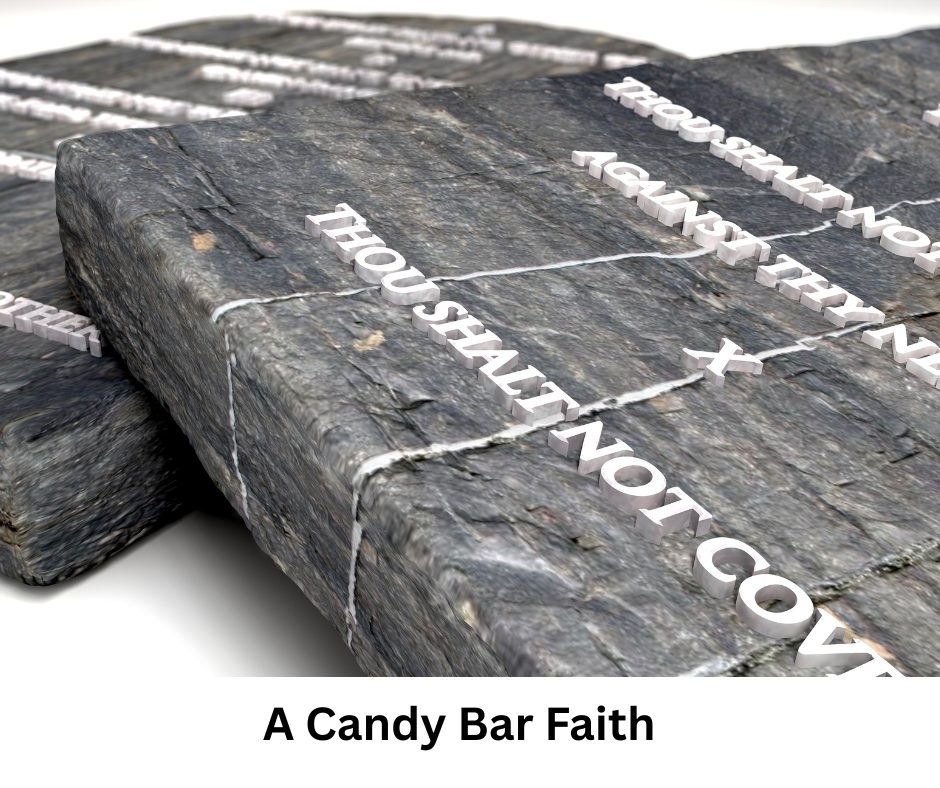
A Candy Bar Faith
As a child, I learned the Ten Commandments. And while I enjoyed the candy bar my Sunday School teacher rewarded me with when I recited them, I have not done the greatest job of keeping them close to my heart. Back then, the commandments felt like something to memorize, something to get right long enough to earn a prize. They lived more in my mouth than in my soul.
As I have grown older, I have realized that many of us never really outgrow that approach. We still tend to treat the Ten Commandments as rules to recite, standards to measure ourselves against, or laws we quietly hope we have not broken too badly. They can feel heavy, distant, or even intimidating. Somewhere along the way, we begin to believe that God gave them mainly to expose our failures rather than to draw us closer to His heart.
Yet it is striking that when God gave the Ten Commandments, He did not begin with commands at all. He began with a relationship. Before a single instruction was spoken, God reminded His people who He was and what He had already done. He was the Lord who brought them out of slavery, the God who heard their cries, the One who moved toward them in mercy long before He ever asked anything of them. The commandments were never meant to be a ladder we climb to reach God. They were a gift placed into the hands of people He had already rescued.
Perhaps God intended the Ten Commandments to be less about restriction and more about direction. They show us what life looks like when it stays close to the heart of God. They teach us how to love Him with our whole lives and how to love others in ways that reflect His character. They do not push us away from God. They invite us to walk in a relationship with Him.
Perhaps that is the invitation before us today. Not to memorize the commandments for a reward, but to let them guide us back to the God who speaks because He wants to be known. When we read the Ten Commandments through the lens of grace, they become less of a burden and more of a doorway. And on the other side of that doorway stands a God who still longs to draw His people close, even when the candy bars are gone.
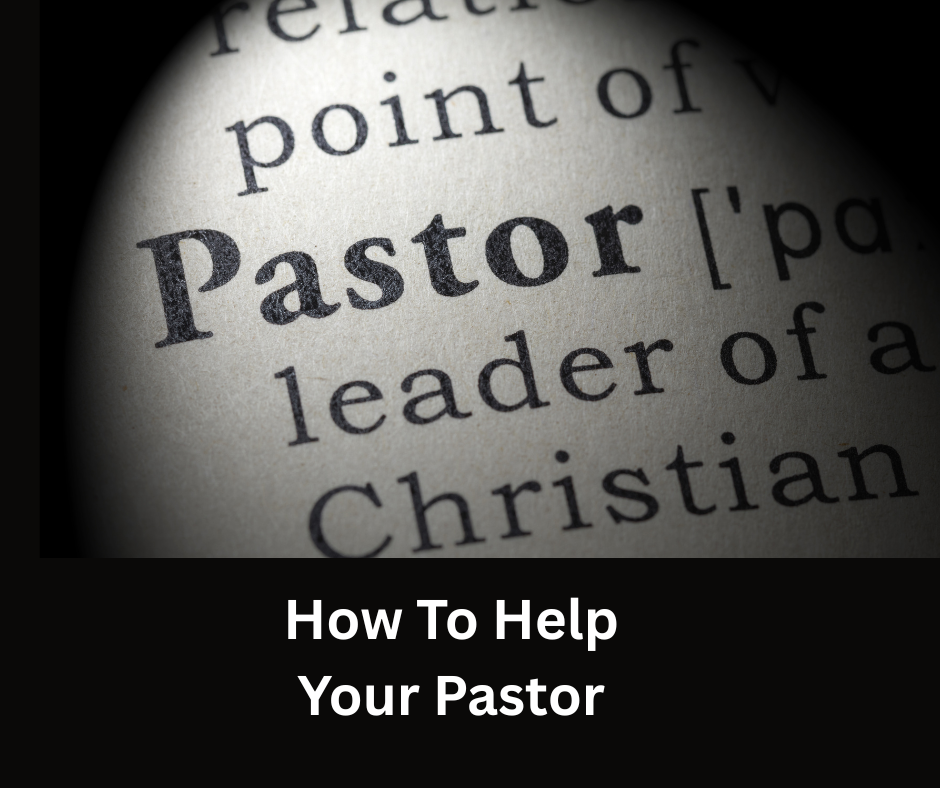
How To Help Your Pastor
If you are a pastor, you already know this. Ministry can be hard. There are always more people to visit, more hospital rooms to walk into, more sermons to prepare. When you live on a twenty-four-hour call, seven days a week, the work can wear you down faster than you expect. Most pastors truly want to shepherd their flocks well. They do not wake up in the morning thinking, “I’m going to exhaust myself today.” And yet, somewhere deep inside, many of us know that our pride and ego quietly push us to do just that. I know this because I lived it.
I entered ministry because I felt God’s call on my life. I worked hard to point people to Him, to soothe the hurt I saw around me, to be a vessel of God’s grace in what often felt like a dry and weary land. More than anything, I wanted to see God glorified, and I took genuine pride in serving Christ and His church. But what they don’t teach you in seminary is how hard the work can be when ego gets in the way.
In Exodus 18, Moses is doing the work of ministry, and it is slowly crushing him. He sits as judge for the people from morning until night, day after day. The needs are endless, and the responsibility feels unavoidable. Ministry is wearing out God’s servant. When Jethro, his father-in-law, sees what this constant demand is doing to Moses and to his family, he speaks plainly. “What you are doing is not good” (v. 17). Moses listens. He admits his failure and appoints others to help carry the load.
I wish I had learned that lesson sooner.
I have many regrets from my years in ministry, but one of the deepest is how consumed I became by the work. I gave myself to it completely, pushing harder and harder, giving more and more, until there was nothing left in the tank. I told myself I was doing it for God. But deep down, I let the enemy whisper a dangerous lie. I began to believe that no one could do the work as well as I could. And when a pastor listens to that lie long enough, God sometimes has to prune the branch.
If you want to help your pastor today, here is what that can look like. Make sure he has time for his family. Help lighten the load so he can actually take a day off or get away with his wife for a weekend. Visit someone in the hospital so he doesn't feel he has to be everywhere. Take a task off his plate so he can pray and study the Word. Encourage him with a note or a text. Let him know you see the effort he is making and how thankful you are for it. But most of all, when you sense he is overdoing it, when people-pleasing and ego are driving him to work seventy hours a week, love him enough to say something.
I do not blame anyone else for how my life turned out. That responsibility belongs to me. But I have learned this much. If a pastor's heart is not guarded, the damage can be great. When that happens, the work of God suffers, and everyone is left standing in the rubble, trying to make sense of what fell apart, unable to put the pieces back together.
Believe me. I know.
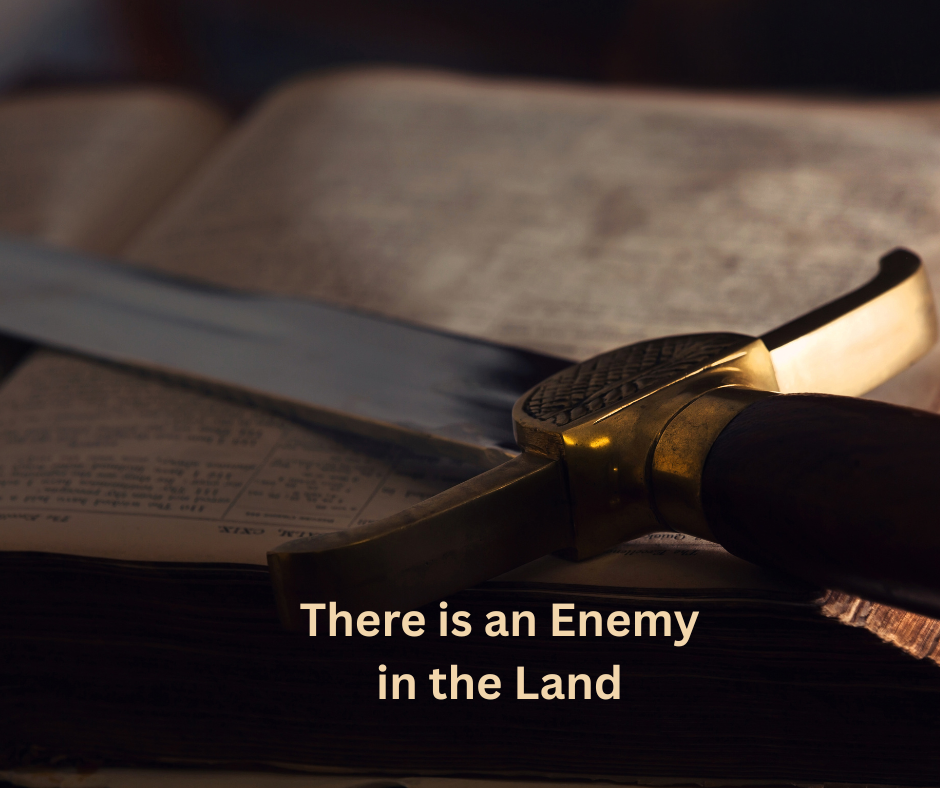
There is an Enemy in the Land
There is an enemy in the land.
No sooner have the children of Israel crossed the Red Sea than they encounter resistance. As much as they may have hoped to live in peace with the people already there, they quickly learn they will have to contend for what God has promised. Exodus 17 tells us that Amalek comes out to fight Israel. God’s people are newly delivered, still learning how to trust Him, still dependent on daily provision, just beginning to understand who He is. Yet freedom has not removed danger. Obedience has not silenced opposition. There is an enemy in the land.
As Christians, we should not expect the road of faith to be free of resistance. There are forces in this world that oppose what God is doing and resent those who live by His promises. The enemy of our souls seeks to steal, kill, and destroy the freedom God has given us. If we are not watchful, he will spare no effort to bring harm and loss, invading homes and families, taking what does not belong to him.
If you read the story, the outcome of the battle is not decided in the valley, but above it. Joshua fights on the ground, but victory turns on what happens on the hill. Moses stands with his arms raised, holding the staff of God. As long as his hands remain lifted, Israel prevails. When weariness pulls them down, the enemy gains ground. Here stands a man between heaven and earth, arms extended, bearing the weight of the battle. It becomes a quiet picture of Christ, whose victory was not won by strength or spectacle, but by faithful obedience that endured to the end. What happened on the hill shaped everything that happened below.
Like the children of Israel won when they look at the outstretched arms of their leader, our focus must remain fixed on Christ and the cross. Victory does not come from staring down the enemy, but from looking upward in trust. We serve a faithful Savior who strengthens the weary, upholds the weak, and secures freedom for those who keep their eyes fixed on Him.
Even when there is an enemy in the land.

Chasing After God's Blessing
The trouble with many of our hearts is that we are always chasing God’s blessing. When the children of Israel entered the wilderness, God met them with daily provision. Each morning, as the frost lifted, manna appeared on the ground, and the people went out to gather it. What God provided each day was enough. But on the sixth day, God did something different. He provided a double portion so the people could rest on the Sabbath. No gathering. No striving. Just a day set aside to rest and worship.
Exodus 16:27 tells us that some people went out anyway, searching for a blessing they already had. They walked the ground with baskets in hand, scanning the earth for manna that was never going to be there. They were still chasing God’s blessing rather than listening to God’s Word.
What is important to remember is that God had not stopped being faithful. He had not withdrawn His care. The manna was missing because God was offering something better than bread. He was offering Himself. Rest. Trust. Relationship. But their hearts were still wired to measure God’s goodness by what He did rather than who He was.
We often do the same thing. We chase outcomes, answers, open doors, and fulfilled prayers. We look for God in provision, success, relief, and progress. And the truth is, God does bless His people. But when blessing becomes the focus, worship quietly slips into the background. Without realizing it, our relationship with God becomes transactional. We love Him for what He gives. We trust Him when the manna shows up. We feel close when prayers get answered. And when those things pause, we start searching the ground, wondering where God went.
So today, perhaps it is time to lift your eyes, lay down the basket, and give thanks for what God has already provided. He is still God, whether there is manna on the ground or not.
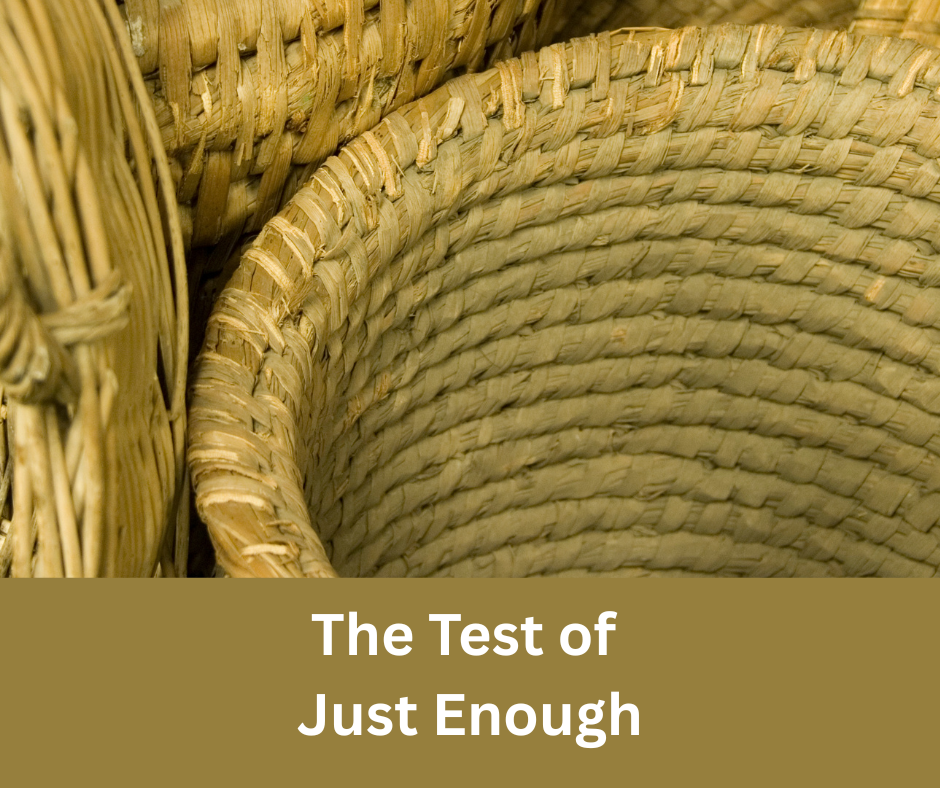
The Test of Just Enough
I don’t like living with just enough. If I had my way, I would make my daily basket a whole lot bigger. Perhaps you can relate. Maybe you grow tired of stretching each paycheck, deciding between food and medicine, or wondering how to make ends meet. Perhaps you look at what others have, and wish God would give you just a little bit more? (I know I have).
The story of manna in Exodus is a hard one. Can you imagine what it must have been like to wake up and see it on the ground every morning? The surprise. The scramble. People rushing out of their tents, gathering as much as they could. Some families gather quickly, filling every container they can. Others can't carry as much. Did the people with more rejoice at their efforts? Did they look down their noses at people whose baskets were smaller? Did they go to sleep at night, their hearts filled with pride at all their hands and hard work had done? Did the people with less wish they had more? Did they close their eyes, complaining to God that they didn’t have enough?
Exodus 16:4 tells us exactly what God was doing. The Lord said He would rain bread from heaven each day, and the people were to gather only what they needed for that day. Anything extra went to the worms. God says. “In this way, I will test them and see whether they will follow my instructions.” God was not just feeding His people. He was teaching a lesson in faith.
If I am honest, this is still an area I struggle with. When my basket often feels smaller than someone else’s (and it often does), I catch myself watching what others have gathered instead of thanking God for what He has placed in my hands.
But manna teaches me this: God gives what I need for today. Not always what I want. Not always what I think I deserve. Just enough to remind me that tomorrow still belongs to Him. And every morning, trust has to be gathered fresh. His mercies are new every morning. This is the life of faith.

A Single Step of Faith
Ever had a Red Sea experience? A moment when you were between a rock and a hard place, with no clear way forward? Maybe it came through an illness, a job loss, or a fractured relationship. Maybe even right now, you are standing in a place where your circumstances are closing in, your options are disappearing, and you find yourself wondering why God has led you here at all. I can relate.
In Exodus 14, God brings the children of Israel to the edge of the Red Sea. Behind them, Pharaoh’s army advances, chariots closing in as dust rises in the distance. In front of them, the waters form an immovable barrier. With no place to retreat and no clear way forward, fear spreads through the camp.
Then God does something remarkable. Through Moses, He makes a way. And gives a simple command: move forward.
I wonder who took the first step. Someone had to. Someone had to answer the fear of the moment with obedience. Someone had to be the one who trusted the word God had spoken and put a foot forward? Faith, in that moment, was not loud or dramatic. Instead, it was a matter of simple obedience.
Who was that person? Scripture never tells us. The Bible never records the name. But this much is certain: someone heard the word of the Lord and obeyed. One simple step of faith led to another, and then another. Soon, others followed. A family moved. Then a people. Before long, a nation walked forward.
The works of God often begin, not with noise or spectacle, but with simple obedience. A single step of faith can open the way for others to follow and experience what God alone can do. So today, you and I have a choice to make. We can take the step God has placed before us, or we can remain where fear keeps us.
Because the miracle begins with a single step of faith.

When God Puts Difficult People in Our Path
Ever notice how God sometimes places difficult people directly in our path on purpose? Even though we pray for peace, resolution, and open doors, there are times when we face resistance, stubbornness, and anger. Scripture reminds us that these moments are not accidents. They are often the very places where God intends to accomplish His purposes.
Moses knew this reality well. God sends him to stand toe to toe with the most powerful man in the land, Pharaoh. A man whose heart grew harder with every encounter. Each time Moses stood before this ruler, the outcome seemed the same: refusal, delay, and increased suffering for God’s people. Still, Moses stood firm. Again and again. Not because Pharaoh softened, but because God had spoken.
What is striking about Moses is that even when everything around him grew increasingly unbearable, he obeyed God’s Word. He stood faithfully as the river turned to blood, as frogs filled the land, and as hail and locusts devastated Egypt. With every plague, Moses' resolve to obey gets stronger. The conditions did not improve. In many ways, they worsened. Yet Moses continued to do precisely what God had told him to do.
Hard hearts have a way of testing us. They tempt us to give up, grow bitter, or soften the truth to make the path easier. But Scripture points us to a better response. The answer to dealing with hard hearts is not control, persuasion, or force; it is obedience. God calls us to speak when He says speak, stand when He says stand, and believe what our eyes cannot see, even when nothing seems to change.
Moses was not accountable for the outcome; he was accountable for his obedience.
So, when you encounter resistance and challenges from someone difficult, remember Moses. God is not asking you to produce results. He is asking you to trust Him enough to obey even if the heart in front of you doesn't.

The Question of Faith
When Moses stands before Pharaoh and asks for Israel’s freedom, the moment unravels almost immediately. Pharaoh does not negotiate. He retaliates. The workload doubles. The pressure intensifies. Life becomes much harder for everyone, and the people turn on Moses. Frustrated, overwhelmed, and confused, Moses turns on God. “Why?” he asks. “Why have You sent me? Why have You made things worse?” (Exodus 5:22). It is the question behind so many of our prayers. Why the delay? Why the resistance? Why does obedience sometimes seem to invite trouble instead of relief?
God’s response is strikingly brief. He does not explain Himself. He does not outline the plan. He simply says, “I am the Lord” (Exodus 6:2). When Moses faces a crisis of faith, God does not provide answers. He gives his servant Himself. Before God reveals what He will do, He reminds Moses who He is.
That is the core of faith. God is not interested in managing our comfort as much as He is shaping our trust. If God always moved on our timetable, faith would shrink into a transaction. We would ask. God would deliver. We would assess His goodness by outcomes rather than character. There would be no need to trust God, only to use Him.
Moses cannot see it yet, but God is preparing him for a long obedience. Leading Israel will require more than courage. It will require a deep, settled confidence in who God is, even when the path forward feels unclear. God is not finished, even when circumstances grow heavier. Sometimes the pressure increases not because God has abandoned us, but because He is drawing us closer.
If God is more concerned with who we are becoming in Him than with what we receive from Him, then perhaps the better question is: why do we so often pursue what God can do for us, instead of learning to trust who He is? This is the question of faith. The question each of us must answer. The answer lies not in why, but who.

Letting Go of What We Know
Ever noticed how often God uses small acts of obedience to set much larger things in motion? In Exodus, when God tells Moses his plan for the children of Israel, Moses voices a very real concern: What if the people don’t believe me? What if they don’t listen to me? God does not respond with a lengthy explanation or a carefully rehearsed argument. Instead, He gives Moses a simple instruction. Cast your rod on the ground.
In that moment, Moses must decide whether to release what he has carried for years or hold onto what he knows. No doubt, the rod feels familiar and safe in his hands. It is the tool he uses daily to guide sheep, steady himself, and even earn a living. There is nothing impressive about this rod. It is simple. Ordinary. Average. Yet it is precisely what God asks for.
In an act of obedience, Moses lets it go. And when he does, God turns the rod into a serpent. Fear follows immediately. Moses steps back, startled by what his obedience has unleashed. This outcome is definitely not what Moses expected from God. But God is not finished. He calls Moses forward again and instructs him to pick up the snake by the tail. (This is where I would have had some trouble with God’s command). That command makes even less sense than the first, yet Moses obeys once more. The serpent becomes a staff again.
Small acts of obedience can demonstrate the glory of God.
That is where we often struggle. We prefer to hold onto what we already know. The familiar (the talents, the abilities, the life that God has already given us) gives us a sense of security. We like control. We crave permanence. Yet, when we grip our lives like the fingers around a staff, so tightly that we dare not let them go, we miss what God will do. We miss the moment God takes our surrender, our small act of obedience, and uses it to show forth His glory. Letting go means allowing God to work in ways we could not even begin to imagine, but it starts with a small act of obedience.
When was the last time you cast your life at the feet of the Father? When Moses released what he knew, God revealed what He could do. Obedience did not remove fear, but it invited God’s power into the moment. The same is true for us. Small, faithful steps, offered willingly, create space for God to do far more than we imagine. But the miracle will never happen if we never let go.

Holy Ground: An Invitation
What is God's plan for you in 2026? As we stand at the threshold of a new year, perhaps that question has crossed your mind. What will God ask of you? What doors will God open? What changes will God bring during the next year? We're wired to want answers, to know the mission, to understand the assignment. And every year, some of us are excited to see what God will do.
It strikes me that when God appears to Moses in the burning bush, a world-changing mission awaits this simple shepherd. The Lord is about to commission a leader who will confront Pharaoh and lead a nation to freedom. The Red Sea. Manna from heaven. Mt. Sinai. The Ten Commandments. The bronze serpent. All of those things are ahead of him. But instead of sharing all the details of the future, God invites Moses to do something first. "Take off your sandals, for the place where you are standing is holy ground." (Exodus 3:5)
We would do well to remember that those sandals carried forty years of wilderness dust. They were worn with the weight of a man who had murdered, fled, and given up on his destiny. Every step Moses had taken as an exile, every doubt that whispered he'd never be more than a shepherd hiding in the desert—it was all caked into the leather of those shoes. His failures. His insecurities. His fears and inadequacies. It is as if God is saying, "Don't let the past intrude on the present."
We want to rush past the burning bush to get to our assignments. We want to know what God is calling us to do in this new year—what ministry, what change, what difference we're supposed to make. But what if God desires from us what He desired from Moses? What if God wants to show us who He is? Maybe He's asking us to take off our shoes—to lay down last year's disappointments, the dust of our striving, the worn-out patterns that keep us at a distance.
So before you make any resolution about what you think God wants you to do, perhaps you need to encounter God for who He truly is. This year, perhaps you need a burning bush experience to lead you toward the future. Remember that the invitation to experience God precedes the assignment. The intimacy comes before the command. God cannot show you what to do until He reveals who He is.

When God Calls Your Name
I envy Moses.
Ever wonder what it must have been like to stand in the presence of God at the burning bush? To have a moment so holy, so divine, so far beyond what the human mind can fully grasp, that it changes you forever. In Exodus 3, Scripture gives us a glimpse into one of the most sacred encounters recorded in the Bible. Moses stands on holy ground and talks with God face to face.
You know the story. On this particular day, Moses is doing what he has done for years. He is tending sheep, working for someone else, literally standing in the middle of the wilderness. His days all look the same. He wakes up, gets dressed, follows the familiar routine of caring for his father-in-law’s flock, eats his evening meal, and goes to bed. Nothing about this day feels special until one day when God shows up in a burning bush and calls his name.
I am struck by how personal God’s call to Moses is. In verse 4, we are told that God calls Moses by name. He does not say, “Hey, shepherd,” or “You there in the desert,” or use any title (Prince of Egypt). God calls him by name. And He does it twice. “Moses. Moses.”
That double call carries urgency and intimacy. When God reaches across the wilderness to the one He will use to deliver the children of Israel, He makes it deeply personal. God was not looking for just anyone. He was looking for Moses. Out of all the shepherds in the desert, out of all the people in Egypt, out of all the children of Israel, God could have used, He chose one fearful nobody who thought his best days had passed him by.
If God calls Moses to a burning-bush moment, perhaps He is calling us to a deeper experience.
Perhaps, this next year, we don't need another list of resolutions. Maybe we just need God to speak to us - personally. Intimately. The way He called to Moses. And maybe we need a heart like Moses had, a heart willing to listen when God calls us to Himself. The truth is, being in God's presence is far better than standing in the wilderness. And too many of us have been languishing in the wilderness for far too long.
Today, if you will hear his voice, you might just have your own burning bush moment, but it will never happen if you do not hear God call your name.

The Holy Ground of Now
As I enter the final days of another year, I find myself standing on holy ground, that sacred space between gratitude and faith.
This year has been challenging for so many of us, and yet as I look back, I'm overwhelmed by God's faithfulness. The moments when provision came from nowhere. The relationships that held me together. The quiet mornings when His presence was so real I could almost touch it. Even in the hard places, my Heavenly Father showed me that His grace really is sufficient, that His strength really does show up in my weakness.
And when I look ahead, my heart fills with expectation. Where will God lead me? What truths will He reveal? What people will He bring into my life to help me grow? What challenges will He allow to strengthen my faith?
This place between the past and the future is holy ground. Why? Because the same God who has been faithful in every moment behind me is already present in every moment ahead of me.
I think of Moses standing before the burning bush, commanded to take off his sandals because he was on holy ground. Those sandals had carried him through forty years in the wilderness, through exile and obscurity, through the dust of tending sheep in a forgotten desert. But God met him there, right at the intersection of his past and his future. The same God who had preserved him through all those years was about to do something extraordinary, something Moses couldn't yet imagine.
As we step into this new year, we may need to do the same. Take off our sandals. Let go of what we've been carrying, the dust and dirt of disappointments, the weight of what didn't turn out as we hoped. Stand barefoot on this holy ground, knowing that the God who kept us through everything behind us is about to lead us into something extraordinary before us.
This place is the holy ground we stand on - between what was and what will be. Like the holy ground Moses stood on, this is where God is. And frankly, it's precisely where I want to be, too.

When the Christmas Decorations Fade Away
Do you realize that there will come a day when all the celebrations of Christmas will be a distant memory? The Bible predicts that the Christ child will rule with a government that will last forever. Isaiah writes, "of the increase of his government and of peace, there will be no end" (Isaiah 9:7).
Think about how temporary our holiday celebrations are. The Christmas tree will brown and be discarded. The lights we carefully strung will be packed away. The wrapping paper we eagerly tore open will end up in trash bags. The festive meals we prepared will become leftovers, then memories, then forgotten entirely. But the One we celebrate? He is establishing a kingdom that knows no decay, no ending, no fading glory.
I forget that reality sometimes. Let's face it: we pour immense energy into creating the perfect Christmas experience, stressing over decorations and exhausting ourselves with preparations. It's easy to forget that all of it is temporary. The most beautiful Christmas display will be dismantled within weeks. The most thoughtful gift will eventually break, wear out, or turn to dust.
Meanwhile, Christ's kingdom continues its unstoppable advance. Isaiah's prophecy speaks of increase, not maintenance. The government on His shoulders grows (even when it doesn't seem like it), expanding in scope, depth, and glory. The peace He brings doesn't flicker like our string lights or fade like our poinsettias. It endures and intensifies forever.
So enjoy the festivities, but hold them with open hands. Let the temporary sparkle of tinsel remind you of the permanent radiance of Christ's throne. Let the brief joy of Christmas morning point you toward the endless celebration when He returns.
The decorations will fade, but His reign never will.

I am King Herod
I am King Herod.
Luke tells us the story of the King of Judea who heard the news brought by the wise men, listened to the prophecies of the biblical scholars of the day, yet ultimately lied and killed his way through Bethlehem when he did not get his way. And while I have never murdered anyone or created a wave of violence, like Herod, there are times when I have heard the truth and refused to bow to it. There are moments when I have seen the signs of God at work, yet would not surrender. Pride, fear, and a desire to stay in control have kept me from Jesus more times than I care to admit.
Herod teaches me that the most dangerous sin is not the one everyone can see. It is the quiet refusal to let Jesus be King. It is the instinct to guard my own throne, defend my own plans, and cling to my own authority, even when I know there is a better way. The tragedy of Herod is not ignorance. It is that he refused to yield to the One who came to save him, even though the same grace that startled shepherds and guided wise men could have redeemed him as well.
Perhaps this Christmas, you harbor malice toward someone else. Perhaps they have wounded you, mocked you, or created a nuisance for your world. Perhaps they have said things you don’t want to hear, opinions you can’t stomach, or made choices you can’t agree with. Perhaps, like Herod, you smile to their face, but grumble behind their back.
The message of Christmas invites us to a better way, one that calls us to release bitterness, hurt, and pain. Maybe God is asking you to surrender what has poisoned your peace and weighed down your heart. Could this Christmas become the beginning of a new way of seeing Jesus, or dare I say it, seeing others the way God sees them?
The truth is that God sent His Son into the world for the Herod in all of us.
I am Herod. And perhaps, so are you.

Finding Yourself In The Christmas Story
Ever see yourself in the Christmas story? If you had been there some 2,000 years ago, what part would you have played? Would you have been the innkeeper who missed the opportunity to embrace eternity? A wise man seeking the Christ Child and laying gifts at His feet? A shepherd, startled by an angel, but then stepping from darkness into the light to see the Savior? Or part of the angelic host, announcing the birth and singing praises to God?
The truth is, I see myself in every part of the Christmas story. There are days when I am the innkeeper, so preoccupied with the demands of life that I overlook the quiet ways God is trying to enter my world. There are moments when I resemble the shepherds, ordinary and unnoticed, yet suddenly aware that God is drawing near, calling me to share what I have witnessed. At times, I am like the wise men, seeking, questioning, journeying, and offering what I have, even when the path feels long. And there are seasons when I long to be like the angels, lifting my voice in worship, declaring God’s glory, and rejoicing in the gift He has given.
Each role challenges me. It shows me where I fall short, but it also reveals what God desires me to become. Christmas invites me to look honestly at my response to Christ, not only in what I know, but in how I live. The message of Bethlehem is not simply about who they were. It is about who we are today and who we are becoming.
The good news of Christmas is that it still seeks a place in our lives. The Savior still calls for worship. The light still breaks into darkness. The wise still seek Him. The question is not only where we would have stood two thousand years ago, but where we stand now.
So if you see yourself in the story, you are not alone. I do too. And that realization invites each of us, this Christmas, not just to admire the story but to take our place in it.
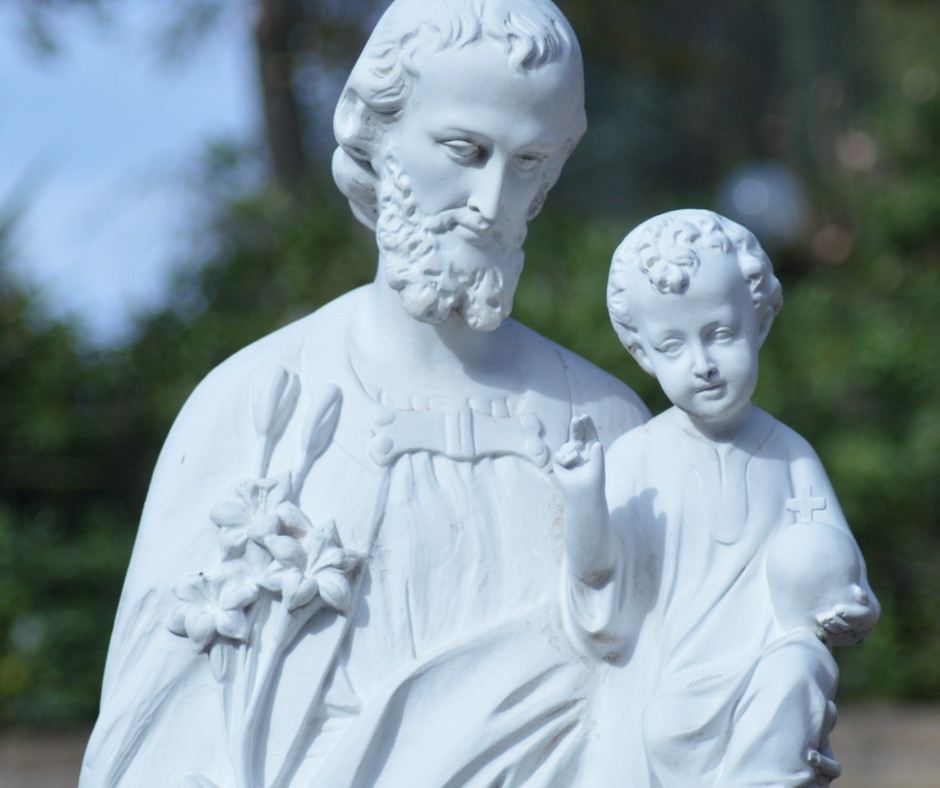
Obeying the Angel's Call
There is a clear pattern in Matthew's description of Joseph in the Christmas narrative. Repeatedly, Joseph receives divine direction through dreams. An angel tells him to take Mary as his wife. Another warning sends him out of Bethlehem in the middle of the night, carrying his young family toward Egypt. Later, he is warned not to return to Jerusalem and is directed instead to Nazareth. Joseph lives in a posture of listening, responding each time God reveals the next step.
What stands out is not that angels delivered the messages, but how Joseph responded. Each time, Scripture records the same outcome: Joseph does what he is told. He rises. He takes Mary. He leaves. He settles where God directs him. Matthew never mentions that Joseph has a question, a protest, or a request for an explanation. There is no delay and no visible struggle. Just obedience.
And that obedience did not make Joseph’s life easier. It made it harder. It drew him into public scandal, forced him into exile in Egypt, and even guided him to settle in Nazareth of all places. Yet, each message moved him exactly where God needed him to be, guarding the child who would one day save the world.
That may be the lesson Matthew wants us to see. God often reveals His will one step at a time, not so we can chart the future, but so we can learn to trust Him in the present. Like Joseph, we are not always asked to understand the plan. We are asked to obey and do what God says do, even when the next step raises more questions than answers.
I have never encountered an angel speaking to me through my dreams, at least not yet. Most of us haven’t. God’s direction often comes quietly, through Scripture, prayer, conviction, or circumstances that close one door and open another. But the heart of obedience remains the same. It does not depend on how dramatic the message sounds. It depends on how willing we are to trust the One who gives it.
And even when we cannot see the whole picture, simple obedience may shape the world in ways we will never fully know. Just like it did for Joseph.

The Danger of the Christmas Story
There is a danger tied to Christmas, and it often goes unnoticed. Each year, we hear the story of Jesus. We sing the carols. We sit in familiar pews. We gather with family and friends. We could recite the story of the babe in the manger as well as any preacher. But knowledge is not the same as experience. It is possible to be so familiar with the Christmas story that we never let it move us. Instead, we admire the miracle from a distance, without allowing it to draw us into a deeper encounter with who Jesus truly is.
Matthew 2 tells us that when the wise men arrived in Jerusalem, searching for the newborn King, they first went to Herod and asked a simple question: “Where is He who has been born King of the Jews?” Herod called in the scholars and teachers of the Law and placed the question before them. They answered without hesitation. “In Bethlehem.” They knew the prophecy. They knew the Scriptures. The words came easily to their lips. Yet their knowledge never compelled them to seek the Christ child for themselves.
Pause and consider the scene. The Messiah had arrived. The road was known. The distance was short. Yet no one gathered a cloak. No one laced their sandals. No one stepped into the night to see for themselves. The scholars possessed everything needed to recognize the moment. They had studied the Scriptures, debated the promises, and mastered the details. They knew about Jesus, but never stood in His presence.
That is the unseen danger of Christmas: knowing about Jesus without truly knowing Him.
Christmas doesn’t ask us just to feel good about the birth. The real message of Christmas is that it asks us to rise, leave what is comfortable, and step into worship that costs us time, attention, and even control. It invites us down a road where obedience replaces convenience and generosity interrupts our plans. This year, perhaps God is asking us to make Christmas not just a story we’ve heard countless times before, but an invitation to follow Him.
But we will never know that reality if we don’t lace up our shoes and step into the darkness to seek Christ.

Breaking Through
Ever wished you could find a little peace during the holidays? I sure have. Right now, the dog is barking for food, the dishes are piling up in the sink, the bills need paying, and my wife is talking about something (I’m honestly not sure what). And to add to everything else, my special needs son is belting out Christmas songs from his iPad like he’s leading his own holiday concert. And here I am, trying to write something. Anything.
The holidays can feel hectic, can’t they? Somewhere between shopping lists, crowded calendars, long to-do lists, and nonstop noise, it becomes hard to experience the “peace on earth, goodwill toward men” the angels sang about. Some days, I find myself longing for a quiet moment. I imagine that if I could step away from the rush and sit still for a few minutes, God might break through the clutter that fills my mind. Perhaps then He could whisper His peace into my heart or remind me of something greater than the chaos around me. I sometimes picture an angel, a star, or even a group of wise men gently pointing me back toward what matters most.
But then I remember, Christmas is not about us escaping the noise. It is about God stepping into it. Jesus was born into a world as chaotic and messy as ours. There were crowded cities, full inns, sleepless nights, and people overwhelmed by life's immediate demands. The shepherds weren’t living peaceful, polished lives; they were tired men doing ordinary work. They were doing what they had always done when heaven suddenly broke through. And the message they heard still stands: “Glory to God in the highest, and on earth peace, goodwill toward men” (Luke 2:14).
God did not quiet the world when Jesus was born. He did not command a moment of silence to honor the arrival of His Son. He did not ask the angels to lower their voices when the holy moment came. Instead, He stepped straight into a noisy, crowded, chaotic world and announced peace right in the middle of it.
So if your house feels loud, your schedule feels full, and your heart feels stretched thin this season, take heart. Peace does not rise out of silence. Peace comes from the presence of Christ. Even a life filled with barking dogs, dirty dishes, and half-heard conversations can become the very place where God draws near.

The First Celebration
Every year, our church has a Christmas production. It is a big deal. There are musicians, actors, dancers, and a choir. The stage fills with lights and props, and the whole event becomes a beautiful, wondrous spectacle.
But have you ever wondered what it must have been like to be part of the first Christmas celebration? Picture the angels standing ready, their voices prepared for a moment that would change the world. They have rehearsed. They have tuned their instruments. They have picked the best singers. Then God reveals to them that their audience will not be kings in a grand castle, but ordinary shepherds on a quiet hillside. No crowds. No pageantry. No big production. Just a few men who never expected to hear anything from heaven.
You have to admire the angels that night. Scripture gives us no hint of hesitation. It simply tells us they appeared, they proclaimed the message God gave them, and they filled the night with worship. “Glory to God in the highest, and on earth peace, goodwill toward men” (Luke 2:14). The song was simple. It glorified God and proclaimed peace to others. When their song ended, they returned to their place in God’s presence and left the shepherds to marvel at what they had heard.
The truth is that God does not reveal Himself according to human expectations. He does not measure importance by size or scale. He chooses shepherds when we would choose kings. He chooses a quiet field when we would choose a crowded stadium. He chooses simple obedience over loud production. God works through the small and the overlooked because His glory never depends on the size of the stage. It rests on the power of His presence. You and I might seek the applause of men, but God is looking for obedience, not attention.
So go ahead and make your Christmas bright. Decorate your home, wrap the gifts, practice for the cantata, and give your best effort. Celebrate with joy just as the angels did. But remember that God is not asking you to make the season louder or grander. He is asking you to do what the angels did. Listen to the message and simply pass it along.

Trading the Eternal for The Immediate
The other day, I was driving when I passed a homeless man carrying a sign. I thought about offering him a few dollars, but I did not. He stood outside a McDonald’s asking for food, yet I kept going. I did not stop for a sausage biscuit or a cup of coffee. I drove by, too focused on my morning schedule to let compassion interrupt my plans. My heart was so caught up in the immediate that I could not pause long enough to be a blessing to someone else.
In the Christmas story, there is another person who lived the same way: The innkeeper. Scripture never mentions him by name, but we know that Mary and Joseph were turned away because there was no room in the inn.
I doubt the innkeeper chased them away or scolded them. I imagine he did what many of us do. He told Joseph that all the rooms were full, then returned to the rush of his other tasks. He traded the eternal for the immediate without even realizing what he had done.
But he was not alone. Bethlehem overflowed with people that night. The streets bustled with travelers returning for the census. Crowds pressed in from every direction. Any person in that village could have stopped to help a young woman in labor. Any of them could have opened a door, offered a chair, or given her a place to rest. Yet no one did. The world was too busy chasing the demands of the moment to see the miracle that was right in front of them.
The truth is simple. We still do the same thing. We rush past needs, moments, and divine opportunities because our calendars feel too full and our minds feel too distracted. The birth of Christ reminds us that God often steps into the world quietly. He invites us to slow down, notice what He is doing, and open the door when He comes near.
What if the innkeeper hadn’t done what he did? What if one of the crowd has paused long enough to help the young couple in need? What if someone, anyone, had stopped what they were doing long enough to be part of a miracle? You will miss being a blessing to others if you are unwilling to recognize the needs of those right in front of you.
This Christmas, choose to do something for someone else. Look past the rush of the season and focus on lifting another person’s burden. God may place you in the very spot where His love becomes real to someone who desperately needs it, but you will never know if you choose not to see.

The Heartbeat of Life
Recently, I had an EKG on my heart (yes, I still have one). The technicians hooked a cluster of wires to my chest while a small machine quietly recorded the rhythm of my heartbeat. After a few minutes, a thin strip of paper slid out, full of peaks and valleys. If you’ve ever studied an EKG, you know exactly what it shows. A sharp rise when the heart beats. A dip when the heart rests. Peaks and valleys, highs and lows, repeating every second of every day for as long as we live.
Isn’t it interesting that God designed the very organ that keeps us alive to mirror the reality of life itself? We experience a high point in life, only to get devastating news from the doctor. We rejoice at our new job only to have a pink slip handed to us months later. We feel the presence of God at church on a Sunday morning, only to have reality smack us in the face on Monday morning. Joy and sadness. Dawn and Dusk. Morning and night. Peaks and valleys are the true heartbeat of life.
If the heart that sustains us rises and falls with every beat, why should we be surprised when our circumstances do the same? Why wonder where God is when we find ourselves in a valley? Why question His presence simply because we can’t feel the warmth of the mountaintop? Why assume something is wrong spiritually just because life has dipped instead of climbed?
Scripture reminds us that this rhythm is normal. “Even though I walk through the valley of the shadow of death, I will fear no evil, for You are with me” (Psalm 23:4). Notice the wording: we walk through the valley, not around it and not above it. Valleys are part of the journey, but so is God’s presence. He is with us in the peaks when life is bright, and He is equally present in the valleys when life grows dim.
So the next time you find yourself in a low place, remember your heartbeat. Peaks and valleys. Highs and lows. They are not signs that something is wrong but reminders that you are alive and that God is faithfully carrying you to the next heartbeat. Let that steady rhythm whisper to your soul that God remains constant in every season, guiding you with purpose and grace. Because truth be told, every beat is a testimony to the God who created you.

The Cure for Doubt
Ever had doubts about God? It might surprise you that even some of the strongest people in Scripture wrestled with uncertainty about God's movement in their lives. In the seventh chapter of Luke, John the Baptist is sitting in a prison cell, wondering if he has misunderstood everything. He sends two of his followers to Jesus with a question that must have weighed heavily on his mind. “John the Baptist has sent us to You, saying, ‘Are You the Coming Christ, or should we look for another’” (Luke 7:20).
Stop and think about that. John the Baptist, the one who boldly preached in the wilderness about the coming Messiah, the one Jesus called the greatest person ever born of women, even he had doubts. Some say John was having a moment of weakness in his faith. I believe this moment is included in Scripture to give you and me hope when our own hearts question God’s plan.
Did you notice how Jesus responded? He did not scold John. He did not lecture him about believing harder. Instead, He said, “Go and tell John what you have seen and heard. The blind see, the lame walk, the lepers are cleansed, the deaf hear, the dead are raised, the poor have the gospel preached to them” (Luke 7:22).
Jesus pointed to what He had already done. His reassurance did not come from future promises but from present reality. That could be the lesson for us. When doubt creeps in, we do not always need a new miracle. Sometimes we need to remember the miracles that have already shaped our lives. The moments when God provided exactly what we needed. The times He lifted us from a sickbed and restored strength. The times He opened our ears to hear truth from Scripture. The moment He saved us when our sin was deep and our hope was small. The day He washed us white as snow.
So today, if you find yourself doubting God, remember that you are in good company. Your questions do not threaten God. Jesus did not rebuke John for doubting. He simply pointed him back to what He had already done. Tell your heart to look there too, and let the works of God you have already seen steady your faith today.

Shall We Gather At The River?
There is an old hymn with a line that invites us to “gather at the river that flows from the throne of God.” Yesterday, while teaching a lesson from Ezekiel 47, I discovered something. In Ezekiel’s vision, an angel of God shows the prophet a stream flowing from His throne, a river that grows deeper and stronger the farther it moves. Every place it touches springs back to life. Dead lands revive. Dry places flourish. Trees grow. This vision is a powerful picture of what the Christian life is meant to be. Our spiritual life begins in the heart of God and as it flows outward to others, hopefully our lives bring renewal, healing, and spiritual fruit wherever they go.
As Ezekiel continues watching this vision, he is invited to step into the river itself. The angel leads him into water that begins at the ankles, then rises to the knees, then to the waist, and eventually becomes a river so deep he must swim.
It occurs to me that some Christians are ankle-deep believers. They have dipped their toes into God’s grace, but they stay close to the shore. They enjoy the refreshing water, but they never wade in far enough to experience its power. Others are knee-deep believers. They attend church, enjoy the singing and the preaching, but their Bibles stay closed during the week. Still others move out to the waist-deep waters. They serve, they volunteer, and they even take on leadership, yet they stop short of the deeper surrender God desires. They stay in places where they still feel the bottom and maintain control.
Then there are those who say, “Lord, take me deeper.” They step into waters where their feet can no longer touch the bottom. They are no longer steering their own course but are carried by the current of God’s Spirit. The farther this river flows, the more life it brings. Trees grow along its banks. Fruit appears in places once abandoned. What was dead begins to live again.
Maybe that is the invitation for us today. Do not settle for ankle-deep faith. Do not remain knee-deep or waist-deep where the water is safe and predictable. God is calling you to deeper waters, to trust Him, to follow Him, and to let His Spirit carry you into places where life can spring up in and around you.
Step in. Go deeper. There is life in the river. And wherever it flows, everything will live. (Ezekiel 47:9). So I guess the only question left to ask is; Shall we gather at the river?

The Power of Thanksgiving
Even Jesus understood the power of a thankful heart. Think about it. Before He multiplied the loaves and fish to feed thousands of hungry people, Jesus lifted His eyes to heaven and gave thanks. Before He called Lazarus out of the tomb, He prayed, “Father, I thank You that You have heard Me” (John 11:41). Even on the night He was betrayed, knowing the cross waited for Him, Scripture says Jesus took bread, gave thanks, and broke it (Luke 22:19). If anyone had reason to withhold gratitude in a difficult moment, it was Christ. Yet He still chose to be thankful.
What does that say to us?
Maybe one thing it tells us is that thanksgiving is more than a polite response to blessings. It is a spiritual posture that opens the door for God to work. Jesus didn’t give thanks because everything looked perfect. He gave thanks because the circumstances before Him required God to move in a supernatural way. Gratitude wasn’t the result of the miracle. Gratitude became the seed that preceded it.
Maybe you’re standing in front of a need that feels too big, too heavy, too uncertain. Maybe you’re praying for a breakthrough, for healing, for help, for guidance. Instead of waiting for God to answer, try following Jesus' example. Give thanks now. Thank Him for hearing you. Thank Him for being faithful. Thank Him for working behind the scenes, even when you can’t yet see it.
Thanksgiving shapes your heart long before it changes your circumstances. It reminds you who God is, what He has already done, and what He is fully capable of doing again. And when you choose gratitude before the miracle, you stand in the same place Jesus stood. You stand confident in the Father’s love and ready to see Him work.
So today, don’t wait until everything is resolved to give thanks. Offer your gratitude now. And trust that the God who multiplies loaves, calls dead things to life, and redeems the darkest moments will meet you in your thanksgiving and do what only He can do.

Where Are The Nine?
Where are the other nine? This was the question Jesus asked the one leper who returned to give thanks. In Luke 17, we witness a powerful example of gratitude. Ten lepers cried out for mercy, and Jesus responded with a simple command. “Go, show yourselves to the priests.” The Scripture tells us that they obeyed, “as they went, they were healed” (v. 14). Yet, only one, when he realized what had happened, turned back. With a loud voice, he glorified God and fell at the feet of Jesus.
We cannot blame the other nine too harshly. Perhaps they were eager to return to their families. Perhaps they had lives to get back to. People to see. Places to go. Perhaps they were caught up in the excitement of being restored; they simply forgot. Maybe they were so focused on obeying Jesus’ instruction to go to the priest that they thought returning might mess up the miracle. Maybe they planned to thank Him later, but never quite got around to it. Scripture does not reveal their reasons, but we understand how quickly good intentions can drift from our minds and cause us to miss the best God has for us.
Consider what these nine obedient lepers missed. The one who returned received more than physical healing. He experienced worship. He discovers a deeper understanding of who Jesus really was. The Bible says he glorified God with a loud voice. He did not care who heard him. He did not wait for a convenient moment. His gratitude overflowed into an open, wholehearted expression of praise. That is the heart of true thanksgiving. A grateful spirit should lead us into worship, yet too often thanksgiving becomes an afterthought. We whisper a polite prayer while the scent of turkey and sweet potatoes fills the house, and we rush through it so we can fill our bellies without really filling our hearts.
Instead of following the crowd, instead of being like the nine, maybe God is inviting you to a time of true worship. Maybe God is watching to see if you will change the direction of your life and let gratitude draw you closer to Jesus. Let it become an act of humble consecration, not just a moment of hurried courtesy. You may not fall on your knees with a loud voice as this leper did (but then again, you probably should - just saying).
You see, it is entirely possible to enjoy the provision of God without ever acknowledging the One who provided the blessing in the first place. The nine lepers experienced a miracle, but only one experienced the presence of the Master. The nine received healing, but only one returned to the Healer. That is the difference gratitude makes.
So today, if you want to be like the nine and enjoy God's blessings, go ahead. Count them one by one. Savor every good gift He has placed in your life. You can follow the crowd, or you can choose to be the one who turns back. The one who worships. The one who lifts a grateful heart even while everyone else is digging into the green bean casserole.
Because the truth is, the sweetest thanksgiving does not happen at the table. It happens at the feet of Jesus.
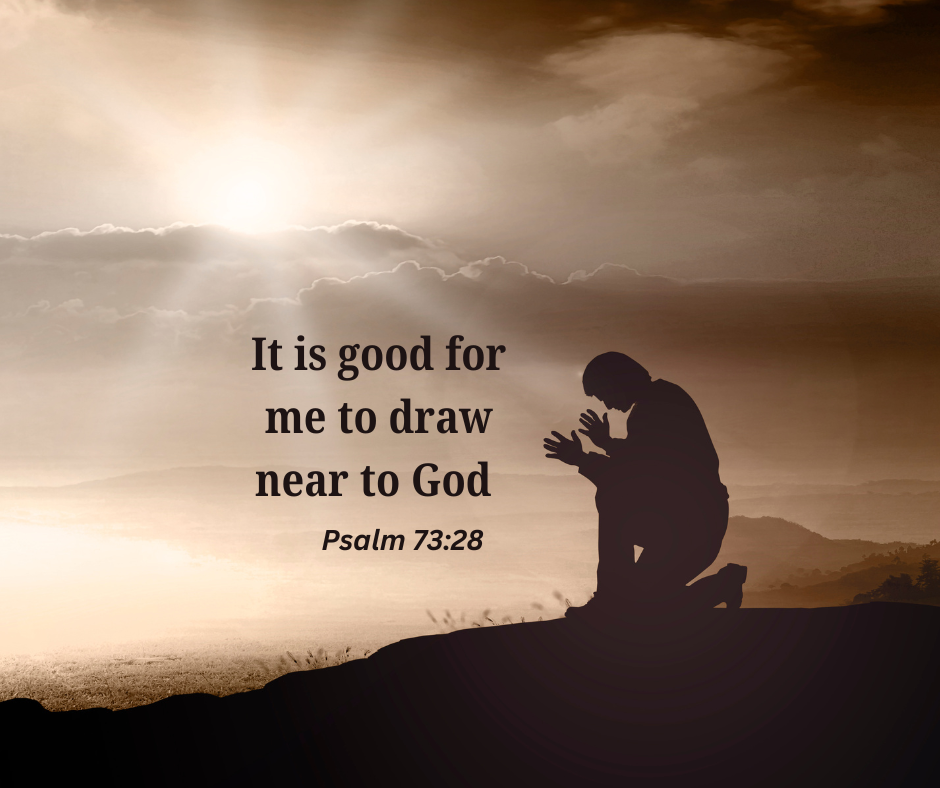
Draw Near To God
As a parent, there is nothing better than when your child draws near to you. Precious moments when your little one falls asleep in your arms. Times when they reach out to grab your hand as you cross a busy street. The days when they follow you from room to room just to be close to you. Even on days when they'd like your counsel about a big decision. One of the greatest joys of my life has been watching my children grow into the beautiful vessels God has prepared them to be, and then watching with delight as they raise families of their own.
I think God feels the same way. As our Heavenly Father, He delights when you and I seek His presence. In Ps. 73:28, the psalmist declares that “It is good for me to draw near to God.” There is just something about being in the presence of God that gives our lives meaning and purpose. And while I am not always very good at sheltering under His wing, there is something in my spirit that resonates with me when I do. As His child, I know that I am better living near Him than being a prodigal child, wasting away my existence in a strange land.
I love how the Psalmist shares with us the benefits of being close to God. If you keep reading, he writes, “I have put my trust in the Lord God, that I might declare all Your works.” Did you notice that there seems to be an order to things here? Drawing near to God’s presence produces trust, which in turn leads to purpose. Intimacy with God strengthens our faith and love for Him, leading to confession. The truth is, we cannot keep silent, because we have discovered how good it is to draw near to the Father.
The book of James says, “Draw near to God and He will draw near to you” (James 4:8). That is a wonderful promise. When you and I move to enjoy His presence, when we seek first the Kingdom of God, when we curl up in the lap of our Creator, God promises that He will draw closer to us. No rejection, just closeness. No distance, just presence. The safety we feel, the security and trust we enjoy, the faith we build are the benefits of drawing near, just like the feeling your child has when they snuggle up to you.
So, today, if you are not where you know you need to be. Pause for a moment to draw near to God. Whisper a prayer. Open your Bible. Take a step of faith. The truth is that any movement toward God is a good thing. You might find the peace that comes from falling asleep in His arms, and He will feel the joy of having you there.

What You Need To Witness
Have you ever felt unqualified to talk about your faith? Maybe you’ve thought, I don’t know enough. I’m not trained enough. Someone else could explain it better. If you’ve ever felt that way, take heart. One of the strongest witnesses in the New Testament had no training, no background, and no reputation, but what he did have was a story of what Jesus had done for him.
In Mark 5, we read about a man who lived among the tombs, tormented by an army of demons. The locals had tried everything. They chained him, restrained him, and even kept watch over the graveyard, but nothing worked. His life was defined by misery, isolation, and brokenness. But then Jesus stepped onto the shore. In a moment of divine authority, He cast the demons into a herd of swine, restoring the man to complete clarity and peace. When the townspeople arrived, Scripture says they found him “sitting and clothed and in his right mind.” Then, as Jesus prepares to leave, the man begs to go with Him. Instead, Jesus gives him one simple commission: “Go home to your friends, and tell them what great things the Lord has done for you.” (Mark 5:19)
No seminary. No training. No discipleship course. Just a story to share..
You could say this former demoniac became the first missionary to the Gentile world. Jesus didn’t send him to a classroom. He sent him to the people who knew his past so they could see the undeniable difference Christ had made.
That’s what evangelism really is—telling your story. You don’t need a degree. You don’t need to know all the answers. You don’t even need a polished presentation. You simply need the courage to speak about what Jesus has done in you.
So the next time you think about being a witness for Christ, don’t give a lecture or a sermon. Just share your story. You never know whose heart might be opened because you were willing to tell what the Lord has done for you. And if God could transform a man who had once lived among the tombs into a powerful witness, He can work through your story too.

Instead of a Crown; A Giant
I heard someone say recently that when God anointed David as king, He did not hand him a crown; He handed him Goliath. That thought has stayed with me. God could have placed a golden crown on David the moment Samuel poured the oil, but instead He chose to shape him long before He seated him on a throne.
Look at how God prepared this young shepherd. He entrusted him with sheep so he could learn responsibility, compassion, and leadership. He allowed a lion and a bear so he could learn courage and boldness. He gave him quiet hillsides so he could learn to pray. And He let a giant step forward so he could learn to trust faith over fear. Every season carried a purpose. Every challenge held meaning. Not a single moment was wasted.
We often forget that God develops His people long before He places them. We want the crown without the pasture, the victory without the preparation, the testimony without the test. Yet Scripture gently reminds us, “The Lord will perfect that which concerns me” (Psalm 138:8). Nothing in your life is random. Nothing is accidental. Nothing is outside the careful and loving plan of your Father.
So when you face something that feels bigger than you, a problem you cannot solve, or a road you cannot see clearly, remember David. God was not finished with him when Goliath appeared. The giant was simply the next step in God’s plan. And the same is true for you. The obstacle in front of you is not a sign that God is done with you. More often, it is a sign that He is preparing you for something greater.
Trust Him. His plan is perfect, even when the path feels uncertain. The battles you never wanted and the obstacles you never expected are not moments of abandonment. They are moments of formation. And in time, you will look back and see how every lion, every quiet hillside moment, every difficult season, and every giant worked together to shape your life. You will see that God was guiding every step, preparing you for the purpose He designed from the very beginning.
Because the God who once gave David a giant instead of a crown may be doing the same for you. For now, trust Him with the giants in front of you, knowing that each one is shaping you for the future He has already prepared.
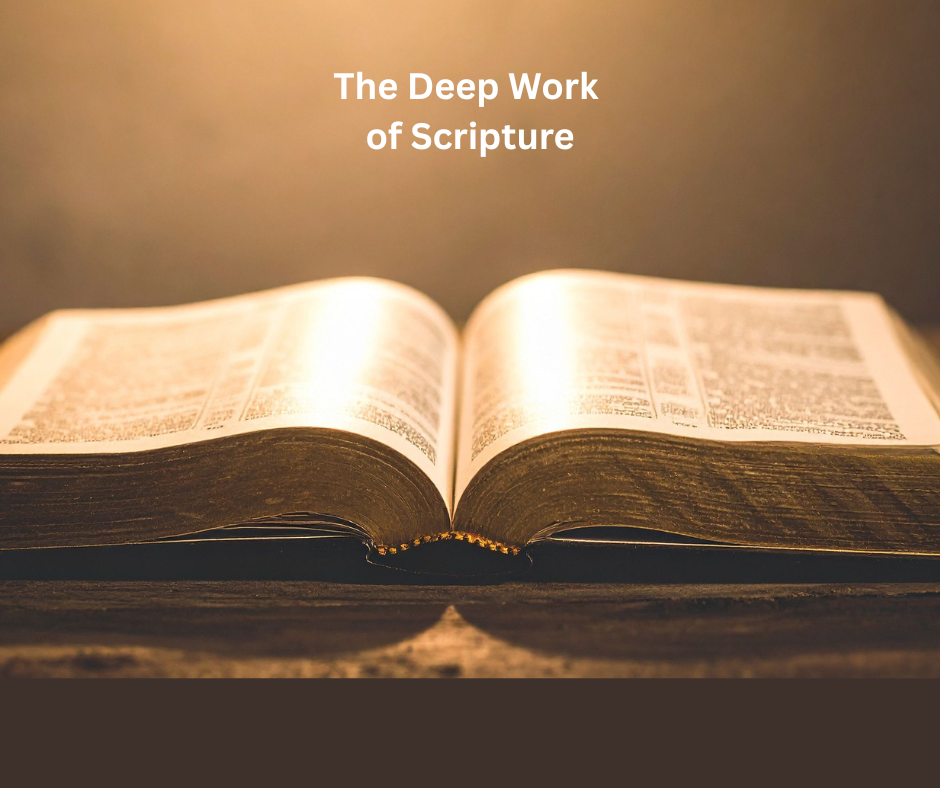
The Deep Work of Scripture
Have you ever noticed how Scripture has a way of reading you while you read it? You sit down expecting to study a passage, and before long, the passage starts studying you.
I am sure that most of us would agree that the primary purpose of Scripture is to teach us about who God is. We love it when the Bible informs and instructs, encourages and uplifts, and reminds us of God’s love, faithfulness, and grace. And while those things matter, the Word also performs a deeper work that many believers never embrace. There are times when Scripture works like a mirror. It reflects what is truly inside us. In those moments, it convicts. It exposes pride, softens stubbornness, and reveals what needs to change. If Scripture never confronts you, then the transformation God desires never begins.
One of my favorite verses about God’s Word is Hebrews 4:12. You might remember it. “For the word of God is living and powerful, and sharper than any two-edged sword, piercing even to the division of soul and spirit, and of joints and marrow, and is a discerner of the thoughts and intents of the heart.” This verse reminds us that God’s Word is not passive or silent. It moves with purpose. It reaches places only God can reach.
Yet, too often, we stop there. We like that God’s word is powerful. We are enthralled at the notion that the scripture is sharper than a sword. We proclaim God’s word is mighty, but let God use it to convict our hearts, or expose our sins, and that is another thing entirely. We like it when God uses His Word to search someone else’s heart, but we balk at the idea that a God who loves us completely might use it to change who we are.
That truth becomes clearer in the next verse. Hebrews 4:13 says, “And there is no creature hidden from His sight, but all things are naked and open to the eyes of Him to whom we must give account.” God sees everything about you. Every thought. Every motive. Every fear. Every wound. Nothing hides from Him. And one day, you and I will have to give an account for how we have allowed the Word of God to do a work in us. (I don’t know about you, but that verse scares me to death).
Think about the last time a verse reached you at precisely the right moment. Maybe you were not searching for it, yet as soon as you heard it, something inside you stirred. That moment did not happen by chance. God aimed that Scripture at your heart because He knew you didn’t just need encouragement, you needed conviction. You see, His Word draws a straight line between what you feel and what He wants to accomplish in your life. So when you hear the Word of God today, slow down and let it speak to you. Don’t just let it lift your feelings, let it pierce your heart. Allow His truth to search you, shape you, and guide you. Because truth be told, the Word of God leads to conviction, and conviction leads to repentance, and repentance leads to life.
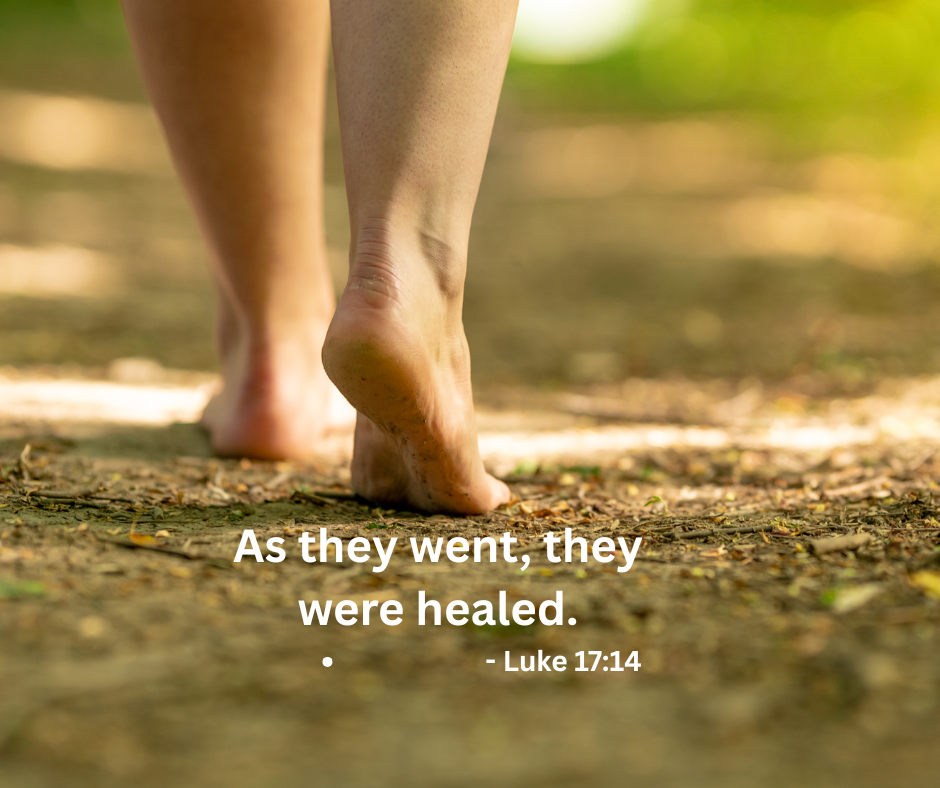
When Prayer is a Journey of Faith
Ever wished God would work faster? Ever prayed for something and felt like heaven hit the pause button? Someone you love gets sick, and you fall to your knees, pleading with the Father for healing, yet nothing changes right away. In those moments, it’s easy to wonder why Jesus doesn’t step in immediately. Why doesn’t He answer the moment we call? Perhaps God is trying to lead you on a journey of faith rather than just granting your wishes like a genie in a lamp..
Luke 17 gives us a clear picture of this truth. Ten lepers stood at a distance and lifted their voices to Jesus, begging for mercy. They asked for healing, and Jesus heard them. Yet instead of touching them on the spot or speaking a word that would instantly restore their skin, Jesus gave simple instructions. He said, “Go show yourselves to the priests.” The miracle did not happen at His feet. It happened as they walked. Scripture says that while they went, they were cleansed (v. 14).
Do not miss that. Their healing required obedience. Jesus could have healed them with a single touch. He could have spoken one word and changed everything in an instant. Instead, He invited them to trust Him step by step. Their answer unfolded on the road, and their healing became a journey of faith. The dusty road they walked became the place where their faith grew.
Maybe you are waiting right now. Maybe you are frustrated because God has not answered your prayer the way you expected. Instead of getting irritated or discouraged, ask Him for grace to see your waiting as part of the journey. Keep walking the dusty road in front of you. Keep trusting His voice. Because somewhere along the way, often when you least expect it, God will begin to work. The answer takes shape. The healing comes. The door opens. And you discover that the waiting not only brought the blessing you needed, it also drew your heart closer to Him.

Letting Go is Christlike
In the book of Mark, we read about a remarkable offer that Jesus made to a rich young ruler. One day, a wealthy young man approached Jesus with a sincere question: “What must I do to inherit eternal life?” Jesus gave him a clear, life-changing invitation. “Go your way, sell whatever you have and give to the poor, and you will have treasure in heaven; and come, take up the cross, and follow Me” (Mark 10:21).
It was the same simple invitation Jesus had extended to fishermen on the Galilean shore and to Matthew at his tax collector's booth. “Follow Me.” But unlike those earlier disciples, this young man walked away sorrowful. He wanted eternal life, but he did not want it enough to let go of everything he already possessed. He wasn’t willing to lose what he had to gain what God offered.
What stands out in this moment is what Jesus doesn’t do. He does not chase after the man who is walking away. He doesn’t panic, plead, debate, or try to convince him with a more persuasive argument. Jesus simply lets him go. The offer remains. The invitation stands. But the choice belongs to the one who hears it.
That same reality still confronts us today. As much as we long for people to know the saving grace of God, not everyone will make Jesus Lord of their lives. Not every heart will soften. Not every person will leave an old way of living and embrace the newness that Christ freely gives. We wish it were different, and it can feel heartbreaking when someone we love refuses the Savior's invitation.
There is a time to witness and a time to encourage, and even a time to persuade. But there is also a time to recognize that the decision does not belong to us. Sometimes, without realizing it, our ministry turns into a form of spiritual codependency. We chase, we push, we plead, and we exhaust ourselves trying to force someone toward Jesus. And when that happens, we are carrying a burden Christ never asked us to carry. (Believe me, I have got that T-shirt).
So today, perhaps we can take a cue from Jesus Himself. When someone rejects His invitation, it is not your failure. It is not your responsibility to make them believe. Release the guilt. Release the pressure. Put that person in God’s hands and keep walking faithfully in your own calling. The invitation of Christ is always there, but the response belongs to the heart that hears it. Sometimes, letting someone go their own way is the most Christlike thing we can do.

When Jesus Walks In The Room
Ever had an unexpected announcement that changed your life forever? The doctor walks in with test results. Your teen daughter sits you down to say she’s pregnant. Your boss steps into your office with a pink slip. Moments like these etch themselves into our minds. They settle deep within our psyche like indelible ink, shaping the way we think, feel, and carry ourselves forward.
The disciples knew that kind of moment. In John 20, Scripture says, “Then the same day at evening… the doors were shut where the disciples were assembled for fear of the Jews, Jesus came and stood in the midst, and said to them, ‘Peace be with you’” (John 20:19 NKJV).
What a scene. The disciples had locked themselves away in a room filled with grief and dread. As night settled in, the flicker of a few candles cast trembling shadows across the walls. Their Master had been crucified. Their hopes felt shattered. Their future seemed to collapse right in front of them. In that small, dim room, fear pressed in like a weight on their chests, draining their courage and leaving their hearts overwhelmed with sorrow.
But then Jesus walked in and everything changed. He appears before the disciples. His presence brings peace where fear had taken root. Joy where sorrow had settled. Purpose where confusion had clouded their minds. I want you to notice that the Risen Christ did not step into that room empty-handed; He came carrying exactly what the disciples needed. And from that moment on, their lives were never the same.
In truth, we all face moments when we desperately need Jesus to step into our lives. Circumstances shake us. News rattles us. Some days our hearts feel tired, fragile, or completely overwhelmed. But then, in the most unexpected and extraordinary ways, Jesus shows up. He speaks peace. He offers His presence. He gives renewed purpose. You might be sitting in a locked, dark room right now. Your faith might feel like a candle struggling to stay lit. But if you wait, God will appear and in that moment, everything will change, because, that’s what happens when Jesus walks into the room.

A New Day To Give Thanks
I am happy to report that I woke up this morning. That might seem like a strange thing to be thankful for, but I am. Another breath means another day to experience and reflect God’s grace. Another day to do good. Another day to encourage someone. Another day to make an impact for the Kingdom.
The psalmist wrote, “This is the day the Lord has made; we will rejoice and be glad in it” (Psalm 118:24). That verse isn’t just a call to be cheerful—it’s a reminder that every new day is a gift from God. He created it, entrusted it to us, and filled it with opportunities to glorify Him. When we recognize that truth, even the most ordinary morning becomes sacred.
It’s easy to take life for granted. We wake up, check our phones, and rush through the motions. But when we pause long enough to thank God for simply letting us open our eyes, gratitude begins to reshape how we see everything. The sunlight feels warmer. The coffee smells richer. Even our challenges seem lighter when we remember that God is the One who holds the day—and us—in His hands.
I once told my father that I wanted to be like Billy Graham. I may never preach to millions, but I can still make my days count. Maybe it’s offering a kind word, praying for someone who’s struggling, or sharing a quiet moment of encouragement. God doesn’t measure our impact by its size; He measures it by our faithfulness.
So today, if you woke up breathing, rejoice. The Lord has made this day—and He made it for you to live with purpose, gratitude, and joy.

When The Lord Saw Her
It was an ordinary day in the little town of Nain, until two very different groups met at the city gate. One group was filled with life, made up of Jesus, His disciples, and a crowd of followers who had seen His miracles and were eager for more. Their conversation carried a sense of joy and wonder. Hope rose with every step, and faith filled the air like a song. There was laughter, anticipation, and the kind of excitement that often surrounded Jesus.
The other group was different. Heavy with sorrow, a widow walked at the front, her head bowed, her tears falling onto the dusty road as she followed the body of her only son to the grave. Around he,d neighbors and friend walkeds, trying to offer comfort, yet their silence spoke louder than words. The air was thick with grief, and the slow rhythm of their footsteps carried the sound of loss and finality. Each step echoed the weight of dreams that would never come true.
Two crowds. Two moods. Two destinations. One carried life, the other carried death. One walked in hope, the other in heartbreak. One knew joy, the other felt the weight of unbearable loss. And right there, in the middle of it all, stood Jesus.
It strikes me that Jesus could have stepped aside and let the funeral pass by. He could have offered a polite word of sympathy and continued on His way. Buthee did not. Scripture says, “When the Lord saw her, He had compassion on her” (v. 13). Before He spoke a word or performed a miracle, He saw this grieving widow. He noticed the pain behind her tears and the emptiness in her eyes, and His heart was moved.
Instead, He stepped forward and touched the coffin, stopping the procession of death in its tracks. With a voice filled with both tenderness and power, He spoke life where death had taken hold. At that moment, her son sat up, and the silence of mourning turned into a chorus of praise. The two crowds became one, united by awe and gratitude in the presence of the One who brings life from death.
Perhaps today you find yourself walking in one of those processions. Maybe you are among those filled with hope, watching God work around you. Or maybe you are in the other crowd, carrying a loss or disappointment that feels too heavy to bear. Take comfort in this truth: Jesus still sees. He still stops. He still acts. The same voice that called the widow’s son back to life still speaks today, offering hope, healing, and new beginnings.
So let your heart be tender. Grieve for what has been lost. Pray for those who are walking in the procession of death. Lift friends and family who have yet to meet the Savior. Because even now, the compassion of Jesus is there. He will step into that pain, and when he does, everything changes. Just as it did that day in the sleepy, little town of Nain.

The Silence of God
Have you ever poured out your heart in prayer, longing for God to move, yet the heavens seemed silent? Maybe you asked for direction, healing, or help, and all you heard in return was silence. It is in those moments that people often wonder whether God has forgotten them or whether their prayers even reach Him. But here is the truth: the silence of God does not mean the absence of God. (You might want to write that on a sticky note.) Even when we cannot hear His voice, He is still near, still working, and still faithful.
God is not ignoring us, and He is not too busy running the universe to notice our pain. Sometimes His quiet is not a rejection but an invitation to trust Him more deeply. Waiting is not wasted time; it is sacred ground where faith grows stronger. It is in those unseen, unanswered spaces that God often shapes our character, deepens our dependence, and prepares us for what is next.
Did you realize that throughout Scripture, God invites His people to call on Him? Psalm 138:3 says, “In the day when I cried out, You answered me, and made me bold with strength in my soul.” Jeremiah 33:3 declares, “Call to Me, and I will answer you, and show you great and mighty things which you do not know.” Romans 10:13 reminds us, “Everyone who calls on the name of the Lord shall be saved.” And Isaiah 55:3 urges, “Incline your ear, and come to Me. Hear, and your soul shall live.”
From Genesis to Revelation, God gives His people the same invitation: Call on Me. If He did not want us to seek Him in our moments of need, He would not have told us to come to Him. God never grows weary of hearing our voices. He welcomes every prayer, even the ones mingled with tears. Sometimes the greatest miracle is not the answer we receive, but the faith He strengthens in us while we wait for His perfect timing.

God's GPS System
Ever had your car’s GPS steer you wrong? The other day, I followed the GPS on my phone to a new place and still ended up lost. I did everything right, followed each turn and every direction, but somehow Google Maps led me to the wrong spot. I’m sure that has happened to you, too. Still, it made me think about how nice it would be if we had a GPS for life, something that could give us clear, step-by-step directions when we do not know which way to go.
Thankfully, we do. God has already given us one in His Word. Psalm 119:105 says, “Your word is a lamp to my feet and a light to my path.” Scripture does more than point us toward heaven; it helps us through the twists and turns of daily life. When we read it and apply it, God’s Word guides our choices, attitudes, and relationships with wisdom and peace.
But just like a GPS, it only works if we actually use it. You can have the best navigation system in the world, but if you never open the app or enter the destination, you will never reach your goal. The same is true spiritually. A Bible that stays closed cannot guide you. When we neglect God’s Word, confusion often follows. Think about the frustration you feel when Siri sends you to the wrong place. You probably muttered a few choice words under your breath when you ended up somewhere you did not want to be. Many people will face that same reality in life, realizing too late that ignoring God’s direction has taken them far from where they were supposed to be.
Proverbs 3:6 reminds us, “In all your ways acknowledge Him, and He shall direct your paths.” When we take time each day to read God’s Word and invite the Father into our decisions, He faithfully provides the direction we need. If you feel lost today, open His Word and let Him show you the way forward. Even if you cannot see the whole road ahead, His truth will always light your next step, and eventually, you will end up right where you were meant to go.

The Medicine of Nearness
Every morning, I get up and take a pill. Doctor’s orders. I don’t really want to take it (and honestly, sometimes I don’t), but I know it’s for my own good. That tiny tablet doesn’t look like much, yet it helps keep things in balance. I don’t see the results right away—most days, it feels like nothing’s happening at all. But when I go back to the doctor and see the lab results, I realize—okay, maybe it was worth taking after all.
Psalm 73:28 says, “It is good for me to draw near to God.” But let’s be honest—sometimes that’s the last thing we feel like doing. When life gets hard, when church has disappointed us, or when we’re simply worn out, spending time with God can feel more like a duty than a delight.
Yet, much like that daily pill, drawing near to God works quietly beneath the surface. We may not notice the change right away, but over time, prayer begins to settle our hearts. Scripture gently reshapes our thinking. Worship softens the edges we’ve built up from pain or frustration.
I’m not suggesting that spending time with God should ever feel mechanical—but it can become a life-giving habit, something that steadies us in a chaotic world. As the book of James reminds us, “Draw near to God and He will draw near to you” (James 4:8).
His presence truly is the medicine our souls need. We might not feel the effects instantly, but one day we’ll look back and realize that the peace we’ve found, the strength we’ve gained, and the hope that’s returned all came from staying close to Him.
So take your dose today. Sit with God. Talk to Him. Let His quiet work begin its healing in you—you might be surprised at the results He brings, simply because you chose to draw near.

The Darkness We Do Not Want
Many years ago, my family and I visited Mammoth Cave in Kentucky. If you’ve never been, it’s quite an experience—an underground world of twisting tunnels and vast caverns that stretch for hundreds of miles beneath the earth. On one of our tours, the park ranger led us into a large chamber, then asked everyone to raise a hand in front of their face. He turned off the lights, and for the first time in my life, I experienced complete darkness. I couldn’t see my hand, though it was only inches from my face. The blackness was so deep it almost felt heavy, pressing in from every side.
I’ve often thought about that moment when I read Jesus’ words about “outer darkness”—the way He described hell as a place where there is weeping and gnashing of teeth (Matthew 8:12; 22:13; 25:30). While we tend to picture hell as fiery and hot, Scripture also paints it as a place utterly without light, hope, or the presence of God. That kind of darkness isn’t just physical—it’s spiritual. It’s the total absence of the One who is light and life itself.
Hell is not a comfortable topic for preachers these days (I can’t remember the last time I heard a preacher mention it), but it is a necessary one. There is a need for those of us who are in the light to warn others that sin separates. Eternal destinies matter. The reality is that wide is the path that leads to destruction and there are many who are crusing down the highway of life without thinking about where they will end up one day.
God doesn’t want anyone to live—or die—without His light. Jesus came to rescue us from that eternal darkness, offering instead the promise of His presence forever. But if we never warn others, or even take this truth into our own hearts with a healthy fear of the Lord, we may succumb to the darkness.
So when the world feels dim or you sense shadows creeping into your heart, remember this: you don’t have to live in darkness. The same Savior who spoke light into existence still says, “I am the light of the world. He who follows Me shall not walk in darkness, but have the light of life” (John 8:12 NKJV).

Sing A New Song
I’ve always admired people who can sing. There’s something about a voice lifted to the Lord that stirs my heart and lifts my spirit. Unfortunately, I’ve never had much musical talent myself. I’m more of a “joyful noise” kind of person. In fact, the quickest way for me to clear a room is to start singing!
But Psalm 96:1 (NKJV) reminds us, “Oh, sing to the Lord a new song! Sing to the Lord, all the earth.” God isn’t looking for perfection—He’s looking for participation. He doesn’t ask for polished harmonies or pitch-perfect melodies; He asks for a new song—a song born of fresh gratitude, renewed faith, and daily experience with His goodness.
When we sing, even off-key, we’re expressing something deeper than sound—we’re offering praise from the heart. That “new song” might be a whisper of thanks in a hard season, a sigh of relief when prayers are answered, or a declaration of trust when life feels uncertain. Whatever form it takes, God delights in hearing it.
So what song is coming out of your mouth today? Too often, mine sounds more like grumbling and complaint than praise. Yet Psalm 96:2–3 calls us to “bless His name, proclaim the good news of His salvation, and declare His glory.” God desires a melody of gratitude, not grumbling—a song that reflects His goodness rather than our frustration.
So go ahead—sing in the shower, hum in the car, or lift your voice in church without worrying who’s listening. Don’t let insecurity silence your song. Offer God a new one today—born of gratitude, faith, and hope—and trust that He’s listening with joy. Because it’s never about how well you sing; it’s about whom you’re singing to.

Ropes of Grace
As someone who wrestles with depression, there are days when my thoughts threaten to drown me. During those times, negativity and uncertainty can pour over my soul, making me feel like I am standing under Niagara Falls with a Dixie Cup. And before anyone rushes to remind me how I should feel as a Christian, let’s be real: the abundant life isn’t always easy. Sometimes, it’s downright brutal.
Jeremiah knew that struggle. In Jeremiah 38, the prophet is thrown into a cistern—a deep pit carved from rock, damp and dark, meant to collect rainwater. But this one held no water, only dirt or mud. Jeremiah sank into the darkness and remained there for many days (Jeremiah 37:16), abandoned and left to starve. Imagine the chill of those stone walls, the echo of silence, the feeling that God Himself had gone quiet. Yet even in that long darkness, God hadn’t forgotten him. The Lord moved the heart of a man named Ebed-Melek, who courageously approached the king and pleaded for Jeremiah’s release. With ropes and old rags to cushion him, and some men to help, they gently pulled the weary prophet out of the pit and back into the light.
That image speaks deeply to me. God doesn’t leave us in the dark forever. Sometimes, His rescue comes not through thunder or miracles, but through the compassion of another person willing to reach into our dark place. And it strikes me that Ebed-Melek didn’t try to rescue the prophet by himself. He took others with him (30 men) to help him lift the prophet before he succumbed to despair and died (Jer. 38:10).
So this morning, if you’re the one stuck in the pit, hold on—God sees you. He’s working behind the scenes to send someone with ropes and rags of grace. And if you’re standing in the sunshine, look around—someone near you might need a lifeline. Don’t judge. Don't remind them of how they ought to feel, or make them feel inadequate because they are struggling. Just do what needs to be done to help them move from the darkness into the light. Reach down and help them find their way back. In fact, take the church with you when you do. I suspect that pulling Jeremiah out of the pit might have been tough for one person to do, but with thirty men all focused on rescuing one soul, the burden was easier to bear.
Is there someone around you who needs you to bring ropes and rags of grace today? Instead of asking God to send someone else—or offering well-meaning but empty words—why not be the answer to their prayer? Grab a rope and start pulling. You might just help someone find their way out of the darkness and back into the light. Just saying.
“He lifted me out of the slimy pit, out of the mud and mire; He set my feet on a rock and gave me a firm place to stand.” — Psalm 40:2 (NIV).

The Lesson of the Tootsie Pop
Remember Tootsie Pops? When I was growing up, my parents had a clever trick for keeping my sister and me quiet on long car rides—they handed us each one of those colorful treats. The hard candy shell surrounded a chewy, chocolatey center that always seemed to take forever to reach. My sister and I would turn it into a competition, racing to see who could get to the middle first. The funny thing about a Tootsie Pop, though, is that you can’t taste the sweetness inside until you’ve made it through the tough outer layer—and the longer you stick with it, the closer you get to the good part.
Life’s a lot like that. Sometimes God allows us to go through hard layers—illness, loss, disappointment, or delay. We want the sweetness of joy, peace, and understanding right away, but instead we find ourselves chipping away at life’s tough shell. Yet the process has purpose. As James reminds us, “the testing of your faith produces patience. But let patience have its perfect work, that you may be mature and complete, lacking nothing.” (James 1:3–4, NKJV).
God isn’t cruel in allowing the hard things. He’s shaping our hearts, strengthening our faith, and preparing us for something richer on the inside. Every struggle becomes a step toward the deeper sweetness of knowing Him more fully. The outer layer may be difficult to endure, but the center—His presence, His peace, His joy—is worth every moment of waiting.
So, when life feels hard, remember the Tootsie Pop. Don’t give up halfway through the struggle. Instead, let the process shape your patience and deepen your faith. If the Tootsie Pop taught us anything as kids, it's that the sweetest part of God’s plan often comes after you’ve endured the hardest layers.

Not Power, But Presence
And after the earthquake a fire, but the Lord was not in the fire; and after the fire a still small voice.” – 1 Kings 19:12 (NKJV)
Have you ever prayed for God to show up in some mighty, unmistakable way—and nothing happened? Elijah knew that disappointment. After standing boldly for God on Mount Carmel, he found himself hiding in a cave, worn out and afraid. He longed for God to do something powerful to change his situation. Instead, the Lord met him in a way Elijah didn’t expect.
The wind tore through the mountains, the ground shook beneath him, and a fire blazed before his eyes—but God wasn’t in any of it. Then came a gentle whisper. And in that still small voice, Elijah discovered what his heart needed most: not God’s power, but His presence.
It strikes me that God was with Elijah the entire time. Even in the cave—dark, lonely, and silent—Elijah wasn’t alone. God didn’t abandon him; He simply chose a quieter way to reveal Himself. Sometimes, we’re so focused on wanting God to move mountains that we miss the miracle of Him simply being with us in the cave.
When God seems silent, remember—His presence is often closer than His power is visible. He may not always shake the earth or send fire from heaven, but He never leaves your side. Take time today to rest in that truth. Instead of asking God to prove His power, invite Him to remind you of His presence. Because when you know He’s near, even the cave becomes holy ground.

He Meets Us In Our Mess
I attend a church that loves to worship. The music is powerful, the atmosphere is joyful, and most Sundays, hands are lifted high. But if I’m honest, there are mornings when I walk in not feeling like worshipping at all. Sometimes I come weighed down by the cares of life—burdened by my own shortcomings and bothered by the battles I’ve fought all week long. My mind feels cluttered, my heart is heavy, and my spirit is tired. In those moments, praising the Lord feels more like a struggle than a song.
And yet, this is the very place where worship truly begins. In the middle of our mess, even when we don’t feel worthy, God still inhabits the praises of His people (Psalm 22:3). That’s because worship isn’t about how we feel—it’s about who God is. That’s the beauty of worship: it’s not about perfection; it’s about presence. God doesn’t wait for us to get cleaned up before He welcomes us in. Scripture reminds us, “Let us then come boldly before the throne of grace, that we may receive mercy and find grace to help us in our time of need” (Hebrews 4:16).
We are needy people invited to approach the throne of grace. That’s exactly how God wants you and me to worship Him. We come not because we’re worthy, but because He is. Worship has never depended on our emotions; it flows from His unchanging nature. And when we lift our eyes to Him, something shifts. The weight of the week grows lighter, our perspective clears, and His presence steadies our hearts.
Action Step: This week, don’t wait to feel ready to worship. Come before the throne just as you are—burdens, doubts, and all. Be honest with God about what’s on your heart, then lift your eyes and your praise toward Him. Watch how His presence transforms your focus from your mess to His majesty.

Times Change, Obedience Does Not
Have you noticed how things that were once clearly right are now up for debate? It seems as if the biblical values that once shaped our lives are now fading into a fog of compromise. Standards shift. Commitments don’t last. Convictions bend under pressure. Half-truths become the norm. Yet the reality is this—our generation isn’t facing anything new. The same patterns have surfaced throughout history.
In Jeremiah 35, God paints a picture for us. In this often-overlooked chapter, God tells Jeremiah to offer wine to the Rechabites—a simple request to most people—but they refuse to drink any wine at all. Why? Because generations earlier, their ancestor Jonadab commanded them not to drink wine, build houses, or plant vineyards, so they followed this advice. Times changed and centuries passed, yet the Rechabites remained faithful to what was handed down. For over 200 years, they honored that instruction. God then uses their loyalty to challenge Judah: “Look at this family—they obey a human command from their forefather. But My people ignore My voice again and again.”
God wasn’t honoring the Rechabites simply because they didn’t drink wine—He was honoring them because they listened and obeyed. In a world full of compromise, they stood firm. As times changed, they held fast to the instruction passed down.
And God rewarded them with a promise: “Jonadab son of Rechab will never fail to have a descendant to serve Me” (Jer. 35:19).
We may not be asked to avoid vineyards, but we are called to live by God’s standards—even when they’re unpopular. When everyone else cuts corners, will you walk in integrity? When the world says, “follow your heart,” will you follow God’s Word? When obedience costs you something, will you remain faithful? The Rechabites show us that obedience is not about convenience—it’s about covenant. And while abstaining from wine might be a small thing, even one small step of obedience honors God. He sees it. Who knows, God might just use your obedience as an example to draw others to Him.

Waiting On God's Promise
Ever gotten tired of waiting on God? Maybe you’ve been praying for something or someone, and it still hasn’t materialized. Maybe you’ve asked for healing, but the sickness has lingered. Maybe you felt that God spoke a word over your life or a family member, but instead of getting better, things actually got worse. Waiting on God can feel like standing still while life rushes past you. And when God seems slow to act, the temptation is to walk away from faith altogether.
There have been times in my own life when I believed God was going to do something—and it didn’t happen. I wrestled with disappointment. I questioned if I had misheard Him. I even wondered if God had changed His mind. What do you do when God doesn’t seem to do what He promised?
The Bible gives us a powerful example in the life of Abraham. God promised Abraham that he would become the father of many nations (Genesis 12:2). But years passed… and nothing happened. Abraham and Sarah grew old. Their bodies weakened. Their hope began to fade. Yet Romans 4:20–21 says, “He did not waver through unbelief regarding the promise of God… being fully persuaded that God had power to do what He had promised.” Abraham waited 25 years before Isaac was born—but God kept His word.
Sometimes God’s promises are delayed, not denied. His timing may not make sense to us, but His faithfulness never changes. The waiting isn’t wasted—God often uses it to grow our trust, deepen our roots, and align our hearts with His will.
So here’s the challenge: Instead of letting waiting weaken your faith, let it drive you closer to the One who made the promise. Keep praying. Keep obeying. Keep believing. Even when you don’t understand His timing, choose to trust His character. And as you wait, ask God to shape you into the kind of person who can receive what He has prepared—because when God fulfills His promise, it will always be worth the wait.

Not Just Thorns...
We’ve all seen the paintings—Jesus on the cross with a jagged crown of thorns pressed into His brow. It’s a heartbreaking image, but recently I heard a preacher explain that crown in a way that stopped me in my tracks. It wasn’t just torture. It was theology.
When Adam sinned, God declared in Genesis 3:18 that the ground would be cursed and “both thorns and thistles it will produce for you.” From that moment on, thorns became a physical reminder of humanity’s rebellion—a symbol of sin, curse, and separation from God. Every thorn that pierced a farmer’s hand and every tangle of briars in the field testified to the same truth: this is what sin has done. Generation after generation felt the weight of that curse as they labored against the ground, constantly reminded of the cost of disobedience.
Fast-forward to the crucifixion. As Roman soldiers mocked Jesus, they twisted together a crown of thorns and shoved it onto His head. They thought they were humiliating Him. But in the sovereignty of God, something much deeper was happening.
Jesus wasn’t just wearing pain… He was wearing the curse.
The very symbol of sin was placed on the sinless Savior. He carried our curse to the cross so we wouldn’t have to carry it anymore. What once represented death now points to redemption. What once screamed “condemnation” now whispers “grace.” The crown of thorns became the crown of life.
If Jesus was willing to wear my curse, why am I still wearing the things He already carried? Guilt, shame, regret—those thorns no longer belong on my head. Today, let’s loosen our grip on the burdens Christ already bore. Lay them at the foot of the cross and walk in the freedom He purchased—because the curse has a new name: victory.

You Can't Earn Enough Points
The other day, I went through the drive-thru and was reminded to check my “points” to see if I could redeem them for some free stuff. The idea of rewards is nothing new. I still remember my mother collecting green stamps back in the day—carefully saving them up to trade for household goods. These days, we’ve just upgraded to digital loyalty programs. But the concept is the same: spend enough, earn enough, and you’ll eventually get something free in return.
Unfortunately, a lot of Christians treat God the same way. They think if they do enough good deeds, give enough money, or volunteer enough hours, they can earn their way into heaven, as if salvation were some kind of spiritual rewards program. But God’s kingdom doesn’t work that way. Ephesians 2:8–9 reminds us, “For it is by grace you have been saved, through faith—and this is not from yourselves, it is the gift of God—not by works, so that no one can boast.”
Eternal life isn’t something we redeem; it’s something we receive. God doesn’t scan our good deeds like barcodes—He looks at our hearts. Our salvation was already paid for at the cross, purchased not with points, but with the precious blood of Jesus. So instead of trying to earn God’s favor, rest in His grace. Live in gratitude, not guilt. Serve because you’re loved, not to be loved. Grace isn’t a rewards system. Don’t expect the angels to meet you at the gate and ask if you’d like to redeem the “points” you’ve earned.
So today, thank God that His grace is free and complete. Let every act of kindness and service be a reflection of that gratitude—not an effort to earn something more, but to honor the One who has already given you everything. While I like getting free stuff as much as anybody, my eternity was never mine to purchase in the first place.

Search Me, God
Unfortunately, the area where I live has an epidemic of pine beetles. Most of the trees in my backyard have been affected by these nasty little creatures. If you’re familiar, the beetle burrows under the bark of the tree, and as it multiplies, it carries a fungus that destroys the nutrient and hydration system of the pine, slowly killing it. The tree doesn’t collapse overnight—it simply dies of thirst from the inside out.
The trouble is, I never saw a single pine beetle, but I’ve certainly seen the evidence of their destruction. What was once a tall and mighty pine, stretching toward the sky, became little more than a rotted stick of wood. By the time I noticed the dying trees, it was already too late to attempt a rescue. The only recourse was to cut them down and stack the wood along the fence for firewood.
It strikes me that our lives can be much the same. The things that damage our relationship with God often work in secret, hiding from the light—an unkind thought, an angry intention, a quiet resentment we justify or ignore. Outwardly, everything may look healthy, but inside, those small, unseen sins can block the flow of God’s grace and drain our spiritual strength.
That’s why David prayed in Psalm 139:23–24, “Search me, God, and know my heart; test me and know my anxious thoughts. See if there is any offensive way in me, and lead me in the way everlasting.” He understood that God’s searchlight isn’t meant to condemn us, but to heal us—to reveal what’s hidden so we can be made whole again.
Like the trees in my yard, we sometimes need our Heavenly Father to peel back the bark of our hearts and expose what lies beneath. When we allow Him to do that gentle work, His grace begins to flow freely again, bringing renewal where decay once lived. So today, take a quiet moment and invite God to search your heart. Don’t fear what He might uncover—His goal isn’t to shame but to restore, to help you grow strong and thriving once more in His Spirit.
Reflection:
What hidden thing might God be asking you to surrender today so that His life can flow freely again in you?

The Blank Page Set Before Us
This morning, I found myself staring at a blank screen, waiting for inspiration to strike. Let’s be honest—writing something meaningful, encouraging, or thought-provoking isn’t always easy. There are days when the words flow easily, and there are times when the empty page can feel like a quiet challenge. As I reflect on the empty page before me, I struggle.. How do I make the words relevant? Uplifting? Challenging? For a moment, I just sit there, unsure of where to start.
But then I begin. A few hesitant words appear on the page, and before long, the thoughts start to flow. Not perfectly—but faithfully.
Ever had a morning like that? You wake up, look at the day stretched out before you, and feel unsure where to begin. Yet once you take that first step—get up, get moving—the day unfolds just as God intended.
Each new morning is a blank page placed gently before us by God’s hand. Psalm 118:24 reminds us, “This is the day the Lord has made; we will rejoice and be glad in it.” Yesterday’s words are already written, and tomorrow’s page is still tucked away unseen. But today—this very moment—the day is ours to fill. God has given us a fresh opportunity to create something beautiful with our choices, words, and attitude.
So what will you write today? Maybe it’s a sentence of kindness, a paragraph of prayer, or a simple act of faithfulness. Don’t be afraid of the blank page—it’s an invitation. God has already placed the pen in your hand; all He asks is that you begin.

The Gospel Still Burns Bright
The heart of God still beats for the lost. His Word declares that He “desires all men to be saved and to come to the knowledge of the truth” (1 Timothy 2:4). That truth has not changed, even if our pulpits have grown quiet about it. In an age where “feel-good” sermons often replace messages of repentance, the urgency of the Gospel still stands firm. Christ came “to seek and to save those who are lost” (Luke 19:10), and His mission remains our calling today.
The tragedy of our times is that many have grown comfortable hearing about God’s love but rarely about His holiness. We preach grace but avoid repentance. We sing about heaven but seldom warn about hell. Yet the same Jesus who stretched out His arms in mercy also spoke of judgment for those who reject Him. Salvation was never meant to be a half-hearted decision or a whispered prayer to ease the conscience. It’s a complete surrender—a death to self and a new birth in Christ. Anything less is a counterfeit gospel.
If the fire has faded in our churches, perhaps it’s because the fire no longer burns in our hearts. The Gospel that once turned the world upside down still has the power to change lives, but it must first change us. Ask God to rekindle your passion for the lost. Let the flames of conviction burn again until you can’t help but speak of His saving grace. When the Church regains her burden for souls, the world will once again see the light of Christ blazing through the darkness.

“But Lord, I Can’t Do This”
Have you ever felt God calling you to do something that made you feel completely unqualified? It could be teaching a class, sharing your faith, or stepping into a ministry role that seemed far beyond your comfort zone. You’re not alone—Jeremiah felt the same way. When God called him to be a prophet, his first response wasn’t excitement, but fear. “Ah, Lord God! I cannot speak—I’m too young” (Jeremiah 1:6).
Jeremiah’s hesitation sounds familiar, doesn’t it? We often see our weaknesses far more clearly than our potential. Yet, throughout Scripture, God seems to specialize in calling the unqualified. Moses stuttered. Isaiah felt unclean. Peter was impulsive. And Jeremiah was convinced he was too young and too inadequate. But God doesn’t call the equipped—He equips those He calls.
For over forty years, Jeremiah faithfully proclaimed God’s message to people who often didn’t want to hear it. He was mocked, imprisoned, and threatened. Still, he persevered because he trusted the One who had called him. Jeremiah learned that obedience mattered more than confidence, and faithfulness was more important than popularity.
So when God calls you to something that feels bigger than you are, don’t focus on what you lack—focus on who sends you. God knows every excuse. He’s heard them all before. When you take that first step of obedience, you’ll find that the God who called you will also walk beside you every step of the way.

Even Shepherds Need Tending
Ever grow weary in doing good? Let’s face it: being kind requires intention, effort, and often more than a bit of selflessness. Pastors know this truth all too well. The call to ministry is filled with joy, but it is also marked by sacrifice. There are always more sermons to write, more sick to visit, more prayers to pray, and more ministries to oversee. And in today’s world, every action and word can feel like it’s being scrutinized—not only in the church pews, but potentially online for the world to see.
In the midst of all this, it’s easy to forget that pastors are human too. They have families who need them, bodies that need rest, and hearts that can grow weary. I often look back on my own ministry days and wish I had taken more time to pour into those closest to me. The truth is, even shepherds need tending.
The Apostle Paul wrote, “Let us not grow weary while doing good, for in due season we shall reap if we do not lose heart” (Galatians 6:9, NKJV). Those words apply to every believer, but they carry special weight for pastors. The harvest may not always be visible in the moment, but God sees their labor of love.
This October—Pastor Appreciation Month—take a moment to encourage your pastor. A note of thanks, a simple prayer, or a kind gesture can breathe life into someone who spends so much of their own life pouring out for others. And if you are a pastor, may you be reminded that your faithfulness matters more than you know—both to God and to the flock He’s entrusted to you.

Dad Jokes
If you’re around me long enough, chances are you’ll hear a Dad joke. I’ve got plenty of them. For example, what’s the first state mentioned in the Bible? Arkansas—Noah looked out of the ark and saw. Or, what kind of car did the apostles drive? A Honda Accord—the Bible says they were all in one Accord. I can even go medical: What’s the difference between bird flu and swine flu? One requires an “oink”ment and the other a “tweet”ment. And of course, there’s the classic: What do you call cheese that isn’t yours? Nacho cheese.
I know—they’re not exactly comedy gold. But that’s not the point. I tell them because, even for just a second, they shift someone’s focus. Life is hard—sometimes overwhelmingly so. And if a corny joke gets a laugh, a groan, or even just a raised eyebrow, then mission accomplished. In that brief moment, someone traded their troubles for a touch of joy.
Proverbs 17:22 reminds us, “A cheerful heart is good medicine, but a crushed spirit dries up the bones.” God built us with the need for joy, and He knows how laughter refreshes us. Just as medicine restores health to the body, laughter restores health to the soul.
So today, look for a way to sprinkle joy into someone’s life. Share a funny memory, offer a smile, or—yes—even tell a Dad joke. You never know how much healing a simple laugh might bring. And who knows? It might just be the medicine God uses to lighten someone’s load, even your own.

Taste and See
My special-needs son has a love language: food. If you put mac and cheese, pizza, BBQ, chicken strips, or even Doritos in front of him, he’ll enjoy every bite. But it wasn’t always that way. When he was younger, he was one of the pickiest eaters you could imagine. He would only touch a certain chicken nugget from a particular place (Hint: Golden Arches).
So what changed? He grew. He began to try different things. Little by little, he developed a taste for new flavors prepared in different ways. His understanding of food didn’t come all at once—it followed his experiences. Each new bite opened the door to something more. There were moments of hesitation, times when he wasn’t sure about dipping his spoon into the bowl, but whenever he did, it always led to a broader, richer palate.
The same is true in our walk with God. Psalm 34:8 says, “Taste and see that the Lord is good.” Notice the order—first, we taste. We pray, open His Word, take small steps of trust, and walk in obedience. As we do, we begin to experience His presence, His provision, and His promises. Our faith deepens not just because we’ve heard about His goodness, but because we’ve lived it, tasted it, and seen His promises proven true.
You may not fully understand what God is doing in your life at this moment. That’s okay. Understanding often follows experience. Just as a child learns to enjoy new flavors, we learn to trust the Lord as we continue to “taste” what He sets before us. Every season, whether sweet or bitter, gives us another chance to discover that His goodness never runs out. So today, make it your prayer: “Lord, help me to keep tasting and seeing Your goodness day by day. Let every experience draw me closer to trusting You, until my understanding deepens into wisdom.”
Who knows, you might develop a new love language.

When God Types A Story
I suppose that I’ve always known I wanted to be a writer. When I was young, my parents had an old Royal typewriter that I set up and nearly wore out. I can still hear the clickety-clack of those keys pounding out the latest story in my imagination. Page after page, ribbon after ribbon, I poured my heart onto paper. Even today, whenever I see one of those old machines in an antique store, I smile and remember the joy I felt as I crafted my latest masterpiece.
In many ways, our lives are like that typewriter—every day another keystroke, every choice another sentence, every season another chapter. Sometimes the pages are messy, sometimes the words don’t come easily, sometimes we have to rip the page up and start fresh, but eventually, God, who is the Author of our story, crafts something beautiful. He takes our raw drafts, our half-finished ideas, and our scribbled margins and weaves them into something meaningful.
The Bible tells us: “For we are His workmanship, created in Christ Jesus for good works, which God prepared beforehand that we should walk in them.” —Ephesians 2:10 (NKJV)
Each morning begins with a blank page. God is ready to write, but He invites us to place the pen—or the keys—in His hands. The question is, will we let Him? When we surrender our day to Him, we begin to see how even the smallest choices—an encouraging word, a quiet act of service, or extending forgiveness—become part of a much greater story.
So when you set your mind to today, don’t be discouraged by yesterday’s crumpled pages. God doesn’t define you by your mistakes, and He doesn’t toss your story aside because of a rough draft. Instead, He offers you a brand-new sheet of paper, crisp and clean, waiting for His words to be written on it. Each sunrise is His reminder that He’s not finished with you yet. So thank Him for the fresh start before you, and choose to place the keys back in His hands. Pray, “Lord, take the keys of my life today. Type out Your story in me. Let every sentence bring You glory, and every chapter reflect Your grace.” Who knows, it might just be part of the greatest story ever told.
What new page is God placing before you today, and how will you invite Him to write His story through your life?

Where Kindness Comes From
Ever been impressed by an act of kindness? I have. There have been moments in my life when someone’s kindness or forgiveness touched me so deeply that it completely changed my outlook. Sometimes it was a simple gesture, other times it was a word of encouragement or even a prayer I didn’t know someone was praying for me. God has often used those moments to meet me right where I needed Him most.
Paul knew the transforming power of kindness. In Ephesians 4:32, he writes, “And be kind to one another, tenderhearted, forgiving one another, even as God in Christ forgave you.” Notice the flow—kindness springs from a tender heart, and a tender heart is nurtured through forgiveness.
But forgiveness is not easy. People hurt us, betray us, or speak against us, and the natural response is to hold on to the pain. When we let those wounds fester, bitterness hardens our hearts, and kindness gets pushed aside. That’s why Paul points us back to Christ. He reminds us that we are to forgive others because we have already been forgiven.
So, what happens the next time someone wrongs us? Instead of repaying hurt with hurt, we can let God’s forgiveness soften our hearts. Make us tender. We can choose to show kindness, extend compassion, and even forgive—because Christ has done the same for us.
Today, ask God to make your heart tender. Let His mercy toward you overflow into the way you treat others. After all, if God had not been tenderhearted with us, none of us would stand a chance. But because He forgave, we can forgive—and because He loved, we can love. Who knows, your act of kindness or forgiveness might be the very thing someone needs to draw them to the Heavenly Father and change their eternity.

A Cup of Coffee and Jesus
I don’t know what your morning routine looks like, but mine always starts with coffee. There’s just something about that first warm sip that helps me come alive and face the day. Honestly, if someone hooked me up to an IV bag of 100% Colombian roast, I wouldn’t complain. My Keurig gets a workout every day, and when I don’t get my morning cup, the rest of my day feels off.
The same is true of time with Jesus. Without it, my day doesn’t flow the same way. In Luke 10, we read about Mary and Martha welcoming Jesus into their home. Martha busied herself with chores and preparations, but Mary made a different choice—she sat at Jesus' feet and listened. When Martha complained, Jesus gently reminded her that Mary had chosen the “good part,” something that could never be taken away from her (Luke 10:42).
I wish I always made that same choice. Too often, my mornings fill with to-do lists, emails, and expectations. Even when I carve out quiet time, my mind drifts toward the day ahead, and before I know it, I’ve rushed through the one thing my soul needs most.
But Mary shows us a better way. She wasn’t distracted by the dishes, the serving, or the stress. She knew that nothing mattered more than soaking up the words of her Savior. And the truth is, Martha’s serving wasn’t wrong—it was good and needed—but it wasn’t the best use of her time.
So here’s the challenge: before you reach for your coffee, reach for Christ. Sit at His feet, even if just for a moment, and let His Word wake up your soul. Because while caffeine may get you through the morning, only Jesus can carry you through the day.
“But one thing is needed, and Mary has chosen that good part, which will not be taken away from her.” – Luke 10:42 (NKJV)

Equipped for The Giants
How about a word of encouragement this morning? I don’t know what kind of giant problems you’re facing today, but do you realize that God has likely already given you everything you need to defeat them?
The story of David and Goliath reminds us of that truth. When young David stood before King Saul and declared his intention to fight the giant, Saul was skeptical. But David boldly testified, “Your servant has killed both lion and bear; and this uncircumcised Philistine will be like one of them” (1 Samuel 17:36, NKJV). In other words, God had already been preparing David long before he stepped onto the battlefield.
Think about it: Who made the smooth stone David used? God. Who allowed lions and bears to attack the flock so David could learn courage? God. Who gave him the skill with a sling? Again, God. Every past trial, every test, every moment of training was part of God’s plan to equip David for this encounter.
The same is true for you. Whatever “giant” looms in your life—fear, illness, financial strain, broken relationships, or uncertainty—God has already placed tools in your hands. Maybe it’s wisdom gained through past trials, strength built in seasons of hardship, or even a gift or skill He’s cultivated in you over time. That giant may look impossible, but the God who prepared David has also prepared you.
So today, face your challenges with confidence. Rest in the knowledge that you are not empty-handed. God has given you what you need for this very moment—and the victory belongs to Him. You don’t have to come up with a new plan or scramble for extra strength; you simply need to step forward in faith with what He has already provided. Just as David ran toward Goliath with nothing more than a sling and a stone, you can move toward your own battles with assurance that the Lord goes before you, behind you, and within you. And when the giant falls, you’ll see how every step of your journey was part of God’s preparation for victory and His glory.

Set Your Mind
The other day, I went into full meltdown mode. I mean, a panic-stricken, no-holds-barred temper tantrum. I’ll spare you the details, but in short, I let my circumstances take control. I worried about providing for my family. I second-guessed every decision. I carried fears that felt far too heavy. I even questioned whether I truly loved God or was worthy to be called His child. There were tears, a lot of anger, and some deep frustration that poured out like the water flowing over Niagara Falls.
When the storm passed, I sensed God speaking to my heart. The real issue wasn’t that I didn’t love Him—it was that I had surrendered the battlefield of my mind. My fear and anger had grown because I was setting my thoughts on everything else but Him.
I think you can relate. It’s so easy to get stuck on the temporary—bills, deadlines, disappointments—instead of the eternal. Paul reminds us in Colossians 3:2-3, “Set your mind on things above, not on things on the earth. For you died, and your life is hidden with Christ in God.” The word Paul uses for “set” (phroneo) is in the present imperative, meaning that it describes a continual action. It means deliberately and continually focusing our thoughts on Christ. It might mean we need to do it a thousand times a day. The point is to keep doing it.
That’s the real struggle of the Christian life: our thinking. The enemy often chooses our minds as the battlefield, and if we leave our thoughts unchecked, they can derail our walk with God. But the good news is we don’t fight alone. Our lives are secure—hidden with Christ.
So the next time anxious or negative thoughts flood in, pause and ask yourself, “Where am I setting my mind right now?” Then shift your focus. Open Scripture, whisper a prayer, or speak God’s promises out loud. Even jot Colossians 3:2 on a card or in your phone. And when fear rises, remind yourself: My life is hidden with Christ—even on manic Mondays when a full-blown meltdown seems to be in order.

The Instruction Manual for Life
The other night, I faced a challenge. My wife had bought a small table for our son and asked me to put it together. I thought, How hard can this be? Just a little table, a couple of legs, some screws, and a wooden top. But once I opened the box, things got complicated fast. The instructions were written in several languages, and the diagrams appeared to require a degree to decipher. So, I did what many of us do—I tossed the instructions aside and got to work.
That decision cost me. I wasted time, grew frustrated, and muttered under my breath about my incompetence and the poor design of the table. Finally, after a great deal of struggle, I gave in and picked up the instructions. I took a breath, followed the steps carefully, and before long the table stood assembled and sturdy—just as it was meant to be.
God’s Word works the same way. When we try to navigate life on our own, without His instructions, we usually end up with a mess. But when we take the time to open Scripture and let it guide us, things begin to fall into place as God intended. The psalmist reminds us, “Your word is a lamp to my feet and a light to my path” (Psalm 119:105, NKJV).
The truth is, we all face decisions and challenges that can leave us feeling confused or frustrated. Instead of rushing ahead, we’re invited to slow down, open God’s Word, and let His Spirit direct our steps. Like that table, life becomes sturdy and purposeful when we build it according to the instructions He’s given.
So today, pick up the instruction manual for life. Ask God to make His Word a light for your path. When His Word becomes your guide, frustration gives way to clarity, and your life comes together with lasting purpose.

Hearing God's Word for the First Time
Do you recall the moment when the Word of God first touched your heart? For me, it was a fall Sunday morning when I was twelve. The pastor was preaching on sin and repentance, and I realized for the first time that while God loved me, there was a problem. Even though I was a “good boy” most of the time, I still needed Him to forgive my sin and make me a new creation.
The Old Testament tells us about King Josiah, who ascended to the throne at the tender age of eight. Years later, while repairing the temple, his workers discovered a forgotten scroll of God’s law. When the words were read to him, Josiah’s heart broke, and he wept. His response of repentance changed not only his life but also the direction of an entire nation (2 Kings 22).
How different this is from the world we live in today. We prefer sermons that entertain us, words that encourage us, and teachings that flatter us. But somewhere along the way, we have lost the ability for the Word of God to break our hearts. Yet Scripture reminds us that without repentance, there is no real relationship with God. Acts 3:19 (NKJV) says, “Repent therefore and be converted, that your sins may be blotted out, so that times of refreshing may come from the presence of the Lord.”
That “refreshing” comes only when we are willing to be broken before Him. Repentance isn’t something we do just once at salvation—it’s a daily posture of humility before God. If we want to see Him move in our lives, our families, and our communities, we must allow His Word to search us, expose hidden places, and bring us back to Himself. When we let repentance soften our hearts, we don’t just find forgiveness—we discover the life, freedom, and refreshing presence of the Lord.

The Presence of God
The other day, while walking our dog, I noticed a large feather sticking out of the ground. I couldn’t be sure where it came from, but I suspect it dropped from the owl that lives in the pine trees behind our house. Though I’ve never seen the owl up close, I know he is there because I hear his call in the stillness of the night. The feather on the ground and the sound of his hooting remind me of his unseen presence.
God is like that. Though we may never see Him face to face in this life, the evidence of His reality is all around us. Scripture tells us, “For since the creation of the world God’s invisible qualities—His eternal power and divine nature—have been clearly seen, being understood from what has been made, so that people are without excuse” (Romans 1:20). The rising of the sun, the beauty of the night sky, the blessings we enjoy, the protection over our families, and the peace that carries us through hard days—all of these are signs of God’s presence and care.
Right now, that feather is sitting on my desk. Every time I look at it, I’m reminded of the One who is unseen yet always near. When life feels uncertain or God seems distant, I can choose to notice these reminders—the little “feathers” He leaves in my path to remind me that I am not alone.
This week, keep your eyes open for the everyday reminders God leaves along your path. When you notice one, pause to thank Him for it, write it down, and let it strengthen your heart with the assurance that the Lord is always there, because truth be told - He is.
“How sweet are Your words to my taste, sweeter than honey to my mouth!” - Psalm 119:103
Oliver Hartman